Go-Ahead set for GM bus franchise success
London-based group is understood to be a big beneficiary from the first round of contracts that will see Greater Manchester’s buses franchised
As Passenger Transport went to press, it was understood that Go-Ahead was poised to be a big winner from the first tranche of tenders to franchise Greater Manchester’s bus network.
Informed sources said the London-based group was set to snap up at least one of the major contracts in the first area to be franchised, covering Wigan, Bolton and parts of Salford. Go-Ahead’s success will be a bitter blow for its rivals, namely incumbent operators Stagecoach and Rotala, although it has been suggested that Rotala has also picked up some work from the first tranche of contracts.
The introduction of the first franchised bus services in Wigan, Bolton and Salford is expected to take place on September 17, 2023. Bids for the first contracts were received by Transport for Greater Manchester by September 9, with eight companies bidding for the two large contracts, two companies bidding for all except one of the small franchises, and a
further company bidding for one small franchise (PT274).
Bidders were informed about whether they had succeeded or not on November 25, with contract awards expected to take place on December 16 following the obligatory standstill period.
The Expression of Interest for the second tranche of contracts, covering the north east of the region was issued in September and will be operational at the end of March 2024. The third tranche, covering the south of Greater Manchester, will be contracted by the end of March 2024 and be operational by January 5, 2025.
GM BUS PLANS: PAGE 10
Railway pioneer Adrian Shooter died this week. Famed as the founder of Chiltern Railways and the chairman of DB Regio UK, which later became Arriva Rail, Shooter reflected on his career last August. “All I ever did was create the vision, hire the very best people and then help them to do their best,” he said. “They, not me, were the people who delighted our passengers.”
CHRISTMAS BREAK
PassengerTransport is taking an extended Christmas break. The next edition of the magazine will come out on January 13. Season’s greetings to all our readers!
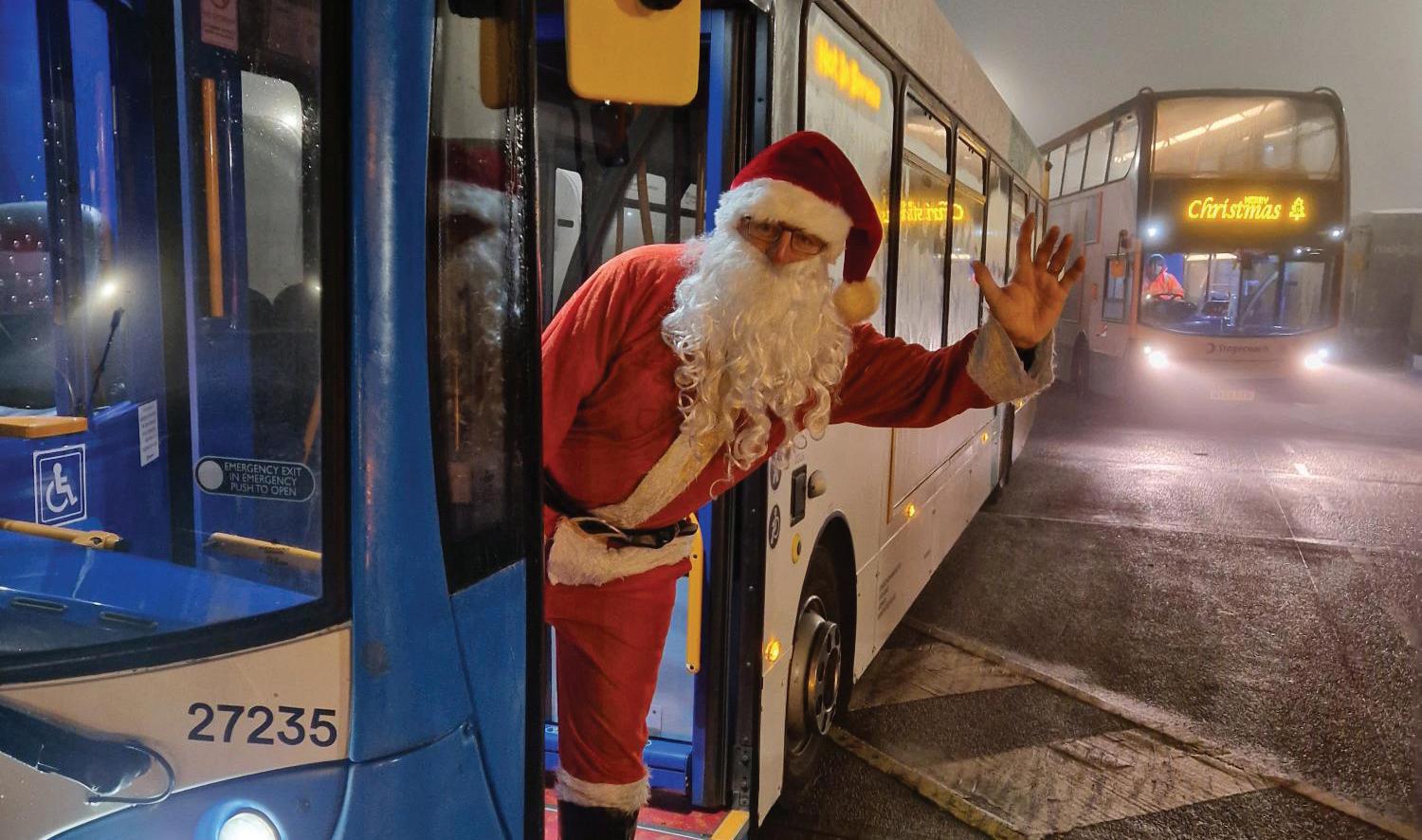
ISSUE 279 16 DECEMBER 2022
NEWS,
VIEWS AND ANALYSIS FOR A SECTOR ON THE MOVE
“Go-Ahead’s success will be a bitter blow for its rivals”
TfL celebrates decade of contactless Easier and more convenient for users 15 Bold measures needed, but is Holden willing? Minister favours carrots over sticks 04 If you come at King Car, don’t miss Jonathan Bray on constraining car use 16 The great scenic journey opportunity Alex Warner wants to grow leisure travel 18 INNOVATION & TECH NEWS EXTRA COMMENT
Chiltern Railways founder credited his colleagues
VISIONARY ADRIAN SHOOTER HAS DIED
SANTA SERVICE Passenger transport operators across the country have found different ways to spread Christmas cheer to the communities they serve.
Pictured above: Santa prepares to drive a Stagecoach Manchester bus.
COMMENT
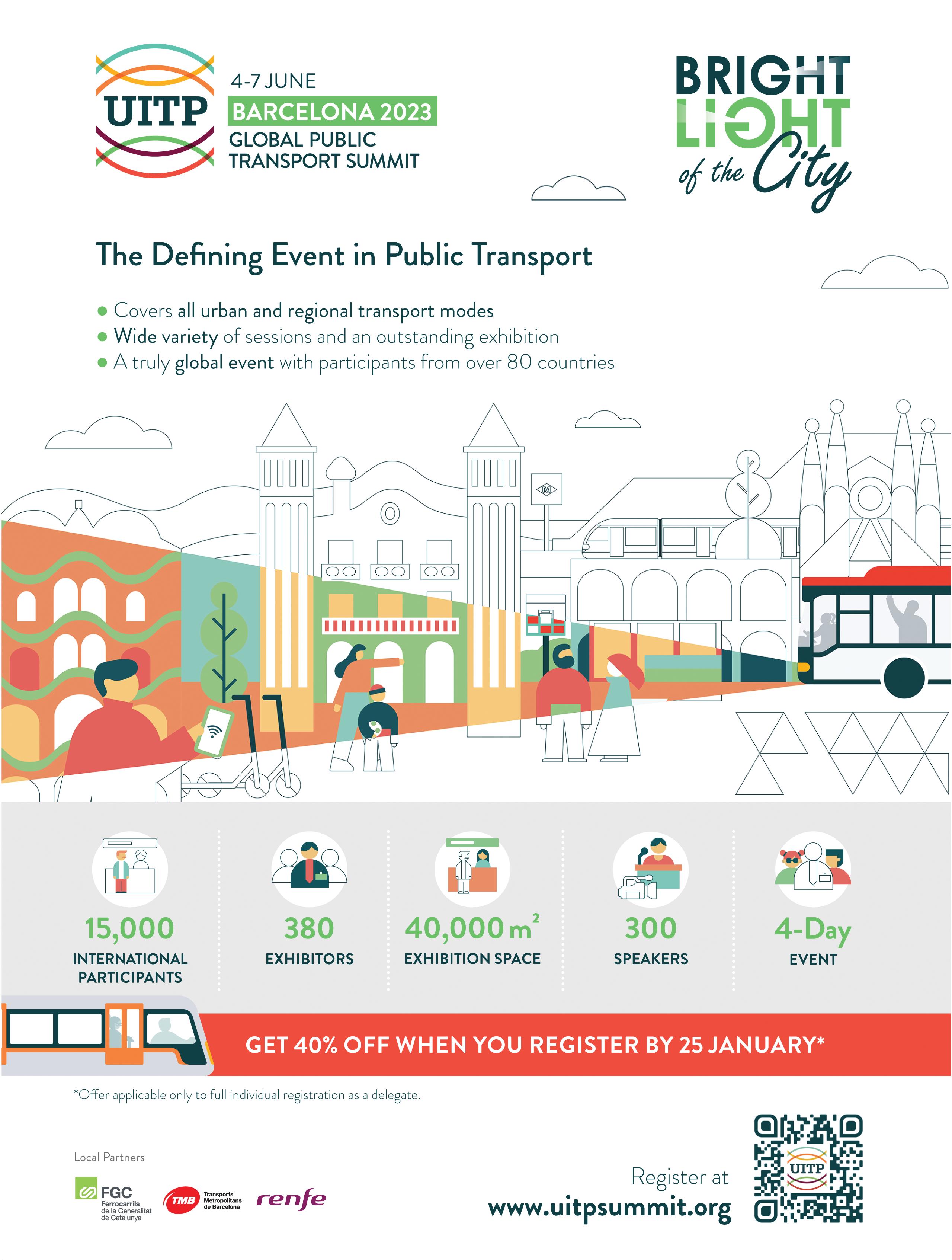
2023 can be a year of recovery and progress

It’s been another tumultuous year for public transport. Having emerged from the pandemic and the lockdowns that simultaneously saw it celebrated for its essential role in transporting key workers and branded as an unsafe space, 2022 has seen the sector struggle to rebuild its customer base. The challenges, such as rampant inflation, labour shortages and industrial action, have mounted. However, government support for the bus and rail sectors has continued. There seems to be recognition among ministers that their ambitions for public transport to become a more attractive and accessible choice will never be achieved if there is a sudden and dramatic drop in service provision. They know that communities the length and breadth of the country might never forgive such an outcome.
2022 has given us things to be positive about. London’s glistening new Elizabeth Line is an example of world-leading mass transit. And the UK Bus Awards Big Book of Big Winners 2022, which accompanies this edition of Passenger Transport, showcases the passion and ingenuity that exists within the sector - despite its challenges. 2023 can be a year of recovery and progress for the sector. Places like Oxford and Cambridge are taking radical steps to constrain cars and prioritise public transport and their success will put pressure on others to follow them. It’s probably too much to hope for a year of stability but let’s hope public transport finally gets some breathing space.
ORGANISATION PAGE
Blackburn with Darwen 11 Cambridgeshire & Peterborough CA 6 CPT (UK) 4-5 DfT OLR Holdings 9 Diamond Bus North West 1 First West of England 7 GBRTT 10 Go-Ahead Group 1 Grand Union Trains 12 Lancashire County Council 11 LNER 9
London Northwestern Railway 8 Metroline 11 Midlands Connect 8 Milton Keynes Council 6 Mott MacDonald 8 Network Rail 9 Northern Rail 9 Office of Rail and Road 12 Railway Industry Association 9 RMT 9
Rotala 1
Social Market Foundation 4-5 Southeastern 9 Stagecoach Highlands 6 Stagecoach Manchester 1, 10 Transport Focus 13
Transport for Greater Manchester 10 Transport for London 12
Transport for West Midlands 11 The Highland Council 6 Vivarail 8
Volvo Bus 11 WECA 7 WMCA 11 WPI Economics 4-5 Wrightbus 11 WSP 8
22 TRANSPORT IS THE ‘BRIGHT LIGHT OF CITY’
Next June, the Spanish city of Barcelona will host the first UITP Global Public Transport Summit in four years. We asked UITP’s secretary general, Mohamed Mezghani, about what visitors can look forward to
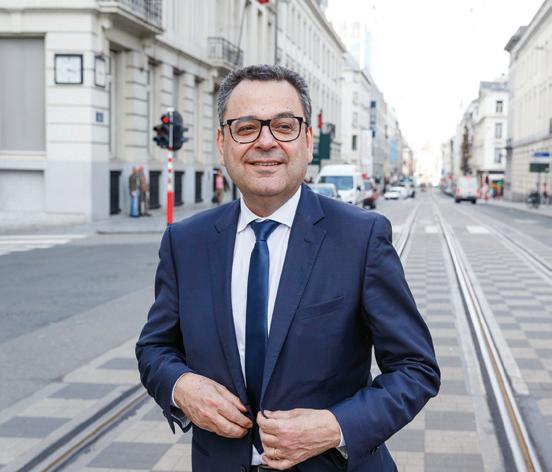
14
TOC S WITH NEW DIESEL TRAINS FACE CHALLENGES
Train Operating Companies which have ordered large numbers of new diesel trains face challenges in decarbonising their fleets later, according to one industry manager. “Having just bought a big fleet of diesel trains is a real challenge for us,” he said
20
G RIM UP NORTH?
D OWN SOUTH TOO
Avanti, Northern and TransPennine Express undoubtedly have issues, but the south of England is suffering from rail woes also. Nick Richardson takes aim at the performance of train operator Southern and the indifferent service he has received recently.
W HAT WILL OUR END OF TERM REPORT SAY?
Great Minster Grumbles: Our Whitehall insider imagines what’s going on inside the minds of the mandarins at Great Minster House, home of the DfT. 2022 has been quite a year, but how would the public transport industry rate the Department’s performance?
IN THIS ISSUE Robert Jack Managing Editor PASSENGER TRANSPORT editorial@passengertransport.co.uk forename.surname@ passengertransport.co.uk Telephone: 020 3950 8000 Managing Editor & Publisher Robert Jack Deputy Editor Andrew Garnett Contributing Writer Rhodri Clark Directors Chris Cheek, Andrew Garnett, Robert Jack OFFICE CONTACT DETAILS Passenger Transport Publishing Ltd PO Box 5496, Westbury BA13 9BX, UNITED KINGDOM Telephone (all enquiries): 020 3950 8000 EDITORIAL editorial@passengertransport.co.uk ADVERTISING ads@passengertransport.co.uk SUBSCRIPTIONS subs@passengertransport.co.uk ACCOUNTS accounts@passengertransport.co.uk Passenger Transport is only available by subscription. Subscription rates per year; UK £140 (despatch by Royal Mail post); Worldwide (airmail) £280 The editor welcomes written contributions and photographs, which should be sent to the above address. All rights reserved. No part of this publication may be reproduced in whole or in part without the publisher’s written permission. Printed by Cambrian Printers Ltd, The Pensord Group, Tram Road, Pontllanfraith, Blackwood, NP12 2YA
PASSENGER TRANSPORT
CONTENTS www.passengertransport.co.uk 16 December 2022 | 03
© Passenger Transport Publishing Ltd 2022 ISSN 2046-3278 SUBSCRIPTIONS HOTLINE 020 3950 8000
PO Box 5496, Westbury BA13 9BX 020 3950 8000 editorial@passengertransport.co.uk
REGULARS
25
NEWS EXTRA 04 NEWS 06 ENVIRONMENT 14 INNOVATION & TECH 15 COMMENT 16 CAREERS 26 DIVERSIONS 28 HAVE YOUR SAY Contact us with your news, views and opinion at: editorial@passengertransport.co.uk
Bold measures needed, but is Holden willing?
A new report by WPI Economics finds that bolder policies are needed to increase bus use, but the new buses minister favours carrots over sticks
congestion charge in urban areas. This could get England threequarters of the way to its net zero goal - while making buses faster, cheaper and more convenient.
Robert Jack Managing Editor
In one of his first public appearances since being appointed as the minister responsible for roads and local transport (including buses), Richard Holden attended the launch of a new report by WPI Economics late last month. Echoing the subject of the report, the launch event - which was organised by the Social Market Foundation and sponsored by the Confederation of Passenger Transport - explored the policy interventions required to get car users to make more journeys by bus and coach.
It was an opportunity to hear Holden’s views on buses, which just two prime ministers ago were placed at the heart of the government’s domestic policy agenda. And the new WPI Economics report, Bus and Coach: The route to net zero, concludes that the success of buses depends on the policy interventions made by Holden and others like him.
The report shows how major benefits could be reaped by levelling the playing field between public transport and the private car. This follows on from a study earlier this year (PT269) which showed that attracting drivers to switch some journeys to bus or coach was necessary to meet net zero targets. This would produce significant economic, social and health benefits and be achievable given people’s support for tackling
climate change.
With a 70-year decline in bus travel, the report makes clear that focusing on one policy alone won’t get the job done. For example, it shows how increasing motoring costs in isolation would hit those who don’t have any other option to use their cars, particularly lower earners. Instead, making bus travel free would cost billions without having a significant impact on people’s travel choices.
The report calls for a realistic, fair and politically achievable package of policies to encourage people to switch two car journeys a month to bus or coach. And it says that this could ensure a reduction in England alone of 10 million tons of CO2 - equivalent to the entire annual transport emissions of the East Midlands.
As well as keeping us on the
path to net zero, moving more people onto bus and coach unlocks huge benefits, such as: £18bn of benefits from reduced congestion; £9bn in health benefits; 58,000 new jobs and £3.6bn additional GDP through better connectivity to job and services.
Matthew Oakley, research director at WPI Economics commented: “A holistic policy package combining an urgent range of sensible interventions will make buses and coaches the natural choice over cars.

“Without a significant step change to government policy, current decarbonisation targets will not be met.”
An example comprehensive policy ticket would be to combine £1bn per year investment in bus services with a £2 fare cap and a
The urban congestion charge would raise sufficient revenue to pay for other elements of the package, provide targeted support to help motorists meet the cost and help government move away from a dependency on fuel duty.
If picked up by decision-makers, WPI claims that these policies could reverse England’s 11% passenger decline per decade between 1980 and 2019, increasing bus patronage by 25% per decade up to 2050.
Combining measures across policy areas could help British cities overtake their European counterparts in productivity. Severe congestion in urban areas from cars currently costs the UK economy £23bn a year.
Richard Holden
Encouragingly, when Richard Holden addressed the launch event he spoke of his personal experience of how important local bus services are. Describing them as “absolutely vital local services that really do liberate people”, he revealed that without a bus service he couldn’t have got to his first job as a waiter in a bar in a market town. “I know how important that was for me and my independence,” he said.
THREE KEY POLICIES
To go the full distance of meeting decarbonisation targets, WPI Economics argues that bus packages across England must cover three key policy areas, with licence to adapt according to local needs:
1. Investment in bus services and infrastructure to increase attractiveness of the bus network, building on local authority plans to deliver the National Bus Strategy;
2. Subsidising bus fares;
3. Charging motorists to drive in congested urban areas.
He pointed out that the government’s Transport Decarbonisation Plan seeks to make public transport the “natural first choice whenever particularly in our towns and cities”, alongside cycling and walking. Meanwhile, the National Bus Strategy for England and the forthcoming £2 fare cap for England (excluding London) are initiatives aimed at boosting bus use.
04 | 16 December 2022 www.passengertransport.co.uk
“Without a significant step change to government policy, current decarbonisation targets will not be met”
Matthew Oakley, WPI Economics
NEWS EXTRA MODAL SHIFT
However, Holden placed the emphasis on things that the bus sector can do to make services more attractive rather the policy interventions that help buses but potentially infuriate motorists.
“To make buses the first choice we’re going to to have to deliver a service that the public want,” he said. “We must make buses more frequent, more reliable, easier to understand and use and better coordinated and cheaper.
“I just think of my own constituency [of North West Durham]. I’ve got multiple bus operators, some of whom don’t work very well together and we are going to have to have a better approach. I think BSIPs [Bus Service Improvement Plans] should really help people get there.”
Most local authorities (48 out of 79) did not receive a share of the £1.1bn funding for BSIPs, but Holden believes that they will still benefit, and he suggested that more funding may come.
“[BSIPs] are not just bids for money, they are also plans for the future in regarding what we are going to deliver,” he said. “So even those who haven’t got funding at this stage - and there may be extra funding in the future - they do have a transport plan to work towards, and which they are working with the department on, which I think is also very important.”
By compelling bus operators and local authorities to work together, Holden believes that Enhanced Partnerships will deliver a “major change”.
Reflecting on his own experience in Country Durham, he said: “Too often it’s political decisions driving some routes rather than actually serving their customers. I hope that the Enhanced Partnerships will really make an improvement there.”
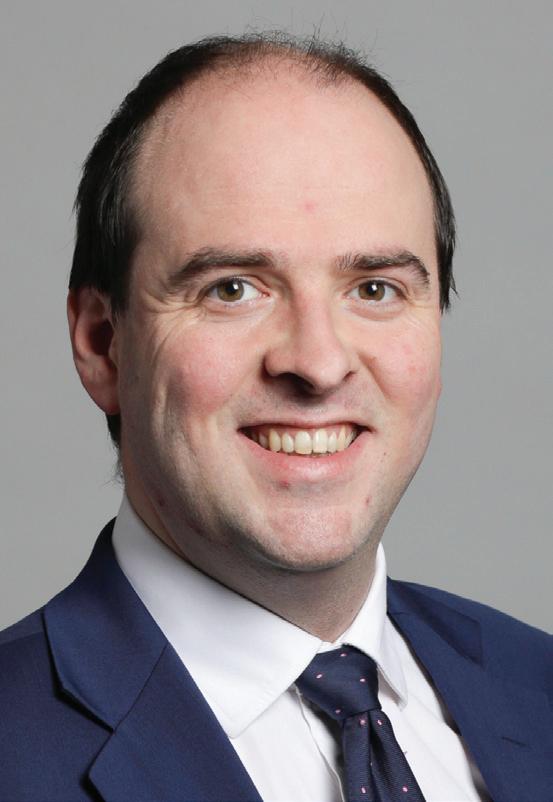
He added: “We also need to
encourage, and this is at the heart of it really, greater cooperation across the board between bus operators and local transport authorities ... If we can drive that change we will be in a much better place.”
Continuing with the theme of improving the existing bus offer, Holden then spoke of the importance of convenient ticketing. He said he was surprised to see that some bus services in his own constituency only take cash, and notes are not accepted.
“We have to get to a system where these services are accessible to everybody and useable by everybody,” he said.
While everyone acknowledges the need to make local bus services as attractive as possible to get more people to use them, Holden was asked what he thought of the WPI Economics analysis that people also need a gentle nudge to change the way they travel. His response suggested that he is not in favour.
“I think the key thing has to be attractiveness,” he said. “Attractiveness and simplicity of ticketing, more accessibility, easier to understand routes, all of that stuff can be done and it’s a relatively easy win without penalising motorists.
“I have no idea how much it costs at the moment for me to go to Crook or to Bishop Auckland or to Durham on a bus in my area. And when Deborah who works on my office told me it cost £2.10 to make a one and a half mile journey from Leadgate to Consett the other day she said ‘in that case I’m just going to take the car’ ... Often what we do is we drive people towards the most expensive first interaction with the bus which has traditionally been a single fare.
One nudge that Holden is comfortable with - the £2 bus fare cap - is a carrot rather than a stick. And he believes it’s an opportunity to “break that barrier to entry”.
He added “We’ve got to start by making buses an attractive option that people feel that they are something that they want to do, rather than they are being forced to do.”
Holden was then asked about bus service cuts, with operators withdrawing services and sometimes pulling out of whole areas. How can we increase ridership if the bus services are no longer there?
“What we are going to do is we are going to get ridership up,” he said. “That’s one of the key things. It’s going to be very difficult for either central
government or local authorities to provide subsidies for services that people aren’t using. That’s why we’ve got this really big push in the New Year on ridership.”
Holden said that he didn’t want the focus of BSIPs to change to sustaining what’s already there. “I want to see something ambitious and growing for the future and that cannot mean we just subsidise decline,” he said.
“We have to look for something positive which is one of the main drivers behind the £2 scheme.”
Lynne Miles, director of city access at the Greater Cambridge Partnership, spoke about plans to introduce local congestion charging in the Greater Cambridge region and use the proceeds to fund improvements to local public transport.
Taking a different view to the minister on nudging people to choose public transport, she said: “All of the evidence that we looked at on behaviour tells us that habits are really hard to shift. You need to get them at the beginning ... the point at which people make work, education and housing choices. In the absence of that you need a stick and road pricing is an element of the stick. It needs to go alongside a carrot.” Holden appeared sceptical. He spoke of the need to ensure that local charging schemes don’t impede people who have to use their cars, like those in voluntary care jobs or district nurses, or penalise low paid workers.
The WPI Economics report concludes what everyone involved with buses knows already: that real progress cannot be made without levelling the playing field between public transport and the private car. Greater Cambridge and other places are offering hope, but Holden’s contribution shows that politicians remain scared of enraging motorists.
www.passengertransport.co.uk 16 December 2022 | 05
“We’ve got to start by making buses an attractive option that people feel that they are something that they want to do, rather than they are being forced to do”
Richard Holden
The Highland Council to launch bus operator
MUNICIPALS
The Highland Council is pressing ahead with plans to launch its own in-house bus operation on January 4. It claims the move will save the council around £1.4m each year on the initial batch of school and local bus service contracts that will be taken in-house.
Services affected by the move are a few schoolday-only services as well as a handful of routes around Inverness, Nairn and Dingwall. All of the contracts are currently operated by private sector bus operators, including Stagecoach.
The council says the new operation will deliver these contracts at lower cost than commercial contractors. It expects that savings from the move could amount to £1.4m
each year for the initial batch of contracts taken in-house, but it admitted there will be set-up costs that include the procurement of a transport management solution.
A meeting of the council’s redesign board heard last month that a project team has now been established comprising three project officers and a bus operations supervisor.
Driving staff are now in the process of being recruited and the lease of an operating centre has been agreed at Cromwell Road
in Inverness.
The council has acquired 12 buses to support the new venture and they include six new MCV EvoRa-bodied Volvo single deckers as well as a handful of second hand double deckers.
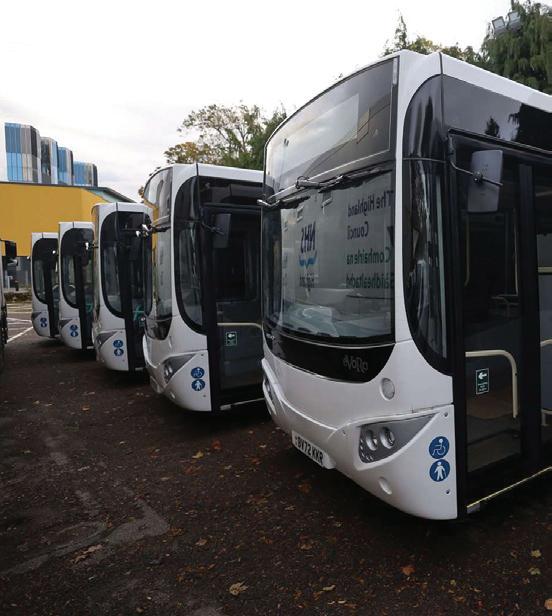
The council has also confirmed it will not use new powers from the Scottish Government that allow local authorities to establish new municipal bus operations. Although it said that option could be taken up in the future, the inhouse operation will launch using a more conventional Section 22 community bus permit.
“Our ambitious in-house bus company will mitigate some of the significant cost increases following the recent re-tendering of passenger and school transport contracts,” said Ken Gowans, chair of the council’s economy and infrastructure committee. “It will also allow us the flexibility for an improved and more inclusive service.”
MK COUNCILLORS BACK CALLS FOR BUS FRANCHISING
REGULATION
Councillors in Milton Keynes have passed a motion backing public control of the local bus network.
They have now requested the chief executive and leader of Milton Keynes Council write to transport secretary Mark Harper and request that the council be given the powers to franchise the local bus network but without the requirement for a devolution deal and the requirement for a directly-elected mayor.
The motion was tabled by Lib Dem councillors who form part of the controlling Labour/Lib Dem ‘Progressive Alliance’. It noted the withdrawal of commercial local bus services has had a negative impact on local residents and that buses play a “crucial role” in reducing emissions.
The motion claimed the lack of franchising powers for unitary authorities meant the government was preventing the council from “effectively managing our own bus services”.
Cambs & Peterborough warns on bus costs
FUNDING
The Cambridgeshire & Peterborough Combined Authority has warned it is facing “significant budgetary pressure” following Stagecoach East’s decision to withdraw from the operation of a number of local bus services (PT274).
CA chief financial officer Jon Alsop told members at the end
of November that while he had been able to set a balanced budget while delivering on strategic objectives in previous years, “the unprecedented pressures arising from supported bus routes has resulted in a potential impact which cannot be met within the existing resources”.
He said the emergency re-procurement exercise to secure
services withdrawn by Stagecoach East, had seen costs for the final five months of the current financial year increase by £1.7ma 50% overspend on the existing £3.4m annual budget.
“To deliver the existing network for the whole of 2023-24 would cost an estimated £7m, double the planned budget of £3.5m,” Alsop said.
However, he warned there was “significant uncertainty” from both the funding side and in terms of costs, which continue to increase as a result of high
inflation. “There is the prospect of potential further withdrawal of routes by existing operators,” he added.
Alsop said members would need to consider whether to continue with the existing network, which would require extra funding to be found; whether to limit service provision to meet existing budgets; or whether to expand supported bus service provision.
He warned the latter option would require additional funding to be identified.
NEWS ROUND-UP 06 | 16 December 2022 www.passengertransport.co.uk
‘Significant budgetary pressure’ from service cuts
Council to seek powers over network from government
operation aims to save £1.4m annually on costs New bus fleet stored outside The Highland Council offices
In-house
Bristol bus crisis leads to calls for franchising
Councillors and city mayor urge WECA to ‘take back control’
REGULATION
Pressure is mounting on the West of England Combined Authority to explore options for franchising the region’s local bus network after Bristol City Council members debated the issue this week.
The move follows the announcement by dominant local bus operator First West of England that it was culling over 1,450 journeys from its network each week in a bid to tackle a mounting driver shortage (PT278). Passenger Transport understands the operator is currently 200 drivers short of its establishment figure.
Dismissing long-held plans for a mass transit metro system, which has been advocated by city mayor Marvin Rees for many years, Liberal Democrats on the city council said “there
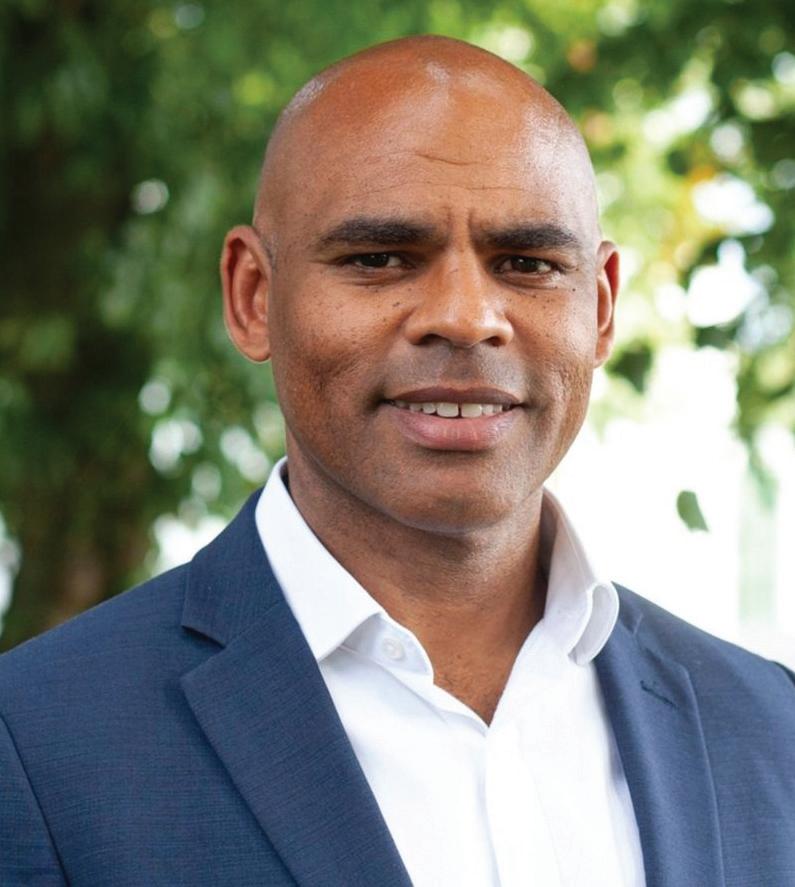
WECA REVEALS
PATRONAGE WOES
Local bus network described as being in a ‘fragile state’
PATRONAGE
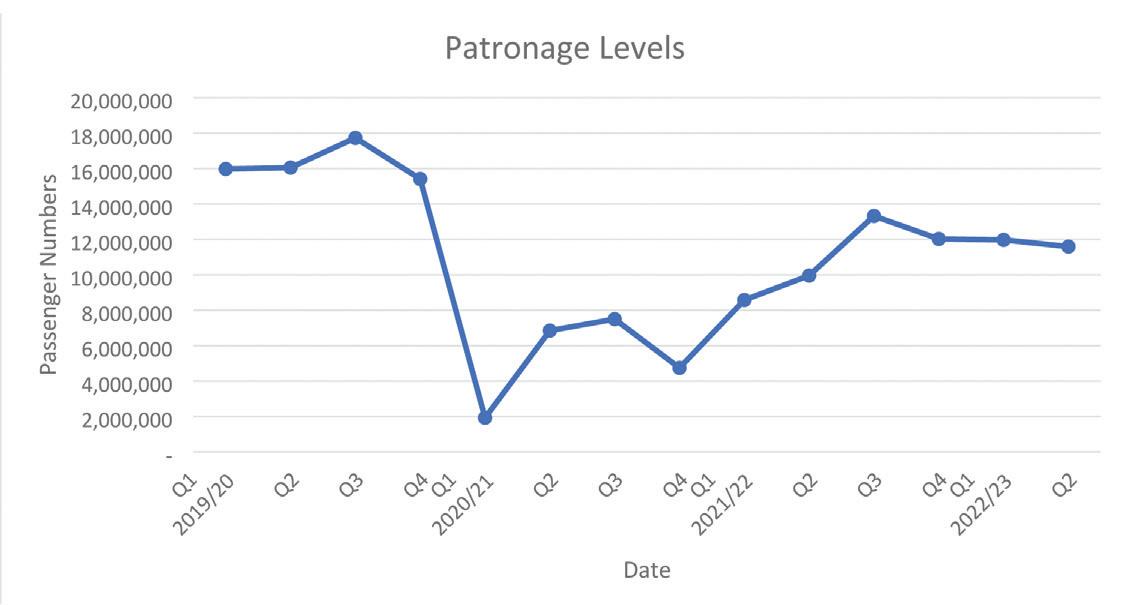
The West of England Combined Authority has described the region’s commercial bus network as being “in a very fragile state”.
In a report to members, Malcolm Parsons, WECA’s head of capital delivery, said the bus network was under constant threat and the capacity to add new services was very restricted - irrespective of funding that may be available.
He highlighted how some
are significant speed and cost advantages in implementing a more comprehensive mass transit solution based on buses as opposed to alternatives that are dependent on costly and disruptive infrastructure”.
They called on West of England mayor Dan Norris to implement a franchised bus network, claiming it would provide the opportunity to comprehensively re-think and re-design how Bristol’s bus service can best serve local residents, the city, and the wider region.
“Bristol’s buses are failing, and all the solutions that have been tried to date have failed - fundamentally, the operators hold all the cards,” said Lib Dem councillor Andrew Brown. “This has been repeatedly demonstrated this year with services being reduced right across the city.
“As things stand, the West of England combined authority has been powerless to ensure that the service is comprehensive, frequent, and reliable, the key factors to ensuring people choose buses over cars for journeys in the city.”
Brown added that introducing a franchised network would allow the West of England “to take back public control of buses, creating a service that prioritises the public good over private profits”.
The Lib Dem motion follows comments by Rees during a council cabinet meeting on December 6 where he urged ‘metro mayor’ Norris to explore franchising options.
“The service we’re getting at the moment in Bristol and beyond is simply not good enough and unfortunately seems to show no sign of getting any better,” he said. “It seems clear the crisis on our buses at this time is not going away. Austerity and deregulation has led to a critical under-funding of our bus transport system.”
Rees said financial support offered to bus operators during the Covid-19 pandemic should not have been offered without the government acquiring a shareholding in their businesses.
He continued: “We shouldn’t have given out free financial support. That could have been a pathway taking us back to more public ownership, which I believe is the best model of ownership for a public good like transport.
“But that ship has sailed. The next best thing we can do is to plot a route at our level to an alternative model of bus management. One of those options will be franchising. We need the West of England mayor to meet with myself, First Bus and other local authority leaders so we can work together to clearly set out the standard of bus services we need.”
modest patronage growth had been decimated by Covid-19 and passenger numbers remain at between 75% and 80% of prepandemic levels. There were also challenges from funding and high levels of cost inflation.
Parsons continued: “There is a need to prioritise interventions on buses to strengthen the core commercial bus network and make it economically viable and sustainable.
“If this core commercial network continues to shrink there is a risk of further decline where paying passengers are put off by poor, unreliable or non-existent services, leading to further revenue declines
and thus further cuts.”
Parsons said WECA aimed to tackle these threats with Bus Service Improvement Plan funding in a bid to stimulate patronage and strengthen
the core commercial network.
“We cannot divert resources away from the above goal, otherwise we risk further reduction in services,” he warned.
www.passengertransport.co.uk 16 December 2022 | 07
Rees: ‘public ownership is best model’
WECA bus patronage still below 2019 levels
“The service we’re getting at the moment in Bristol and beyond is simply not good enough”
Rail hub plans aim to transform connections
Plans dubbed ‘biggest step possible in levelling-up Midlands’
CAPACITY
Midlands Connect has published plans that propose spending £1.5bn on new or improved rail infrastructure between 2025-2030 that would allow the operation of over 100 extra trains each day.
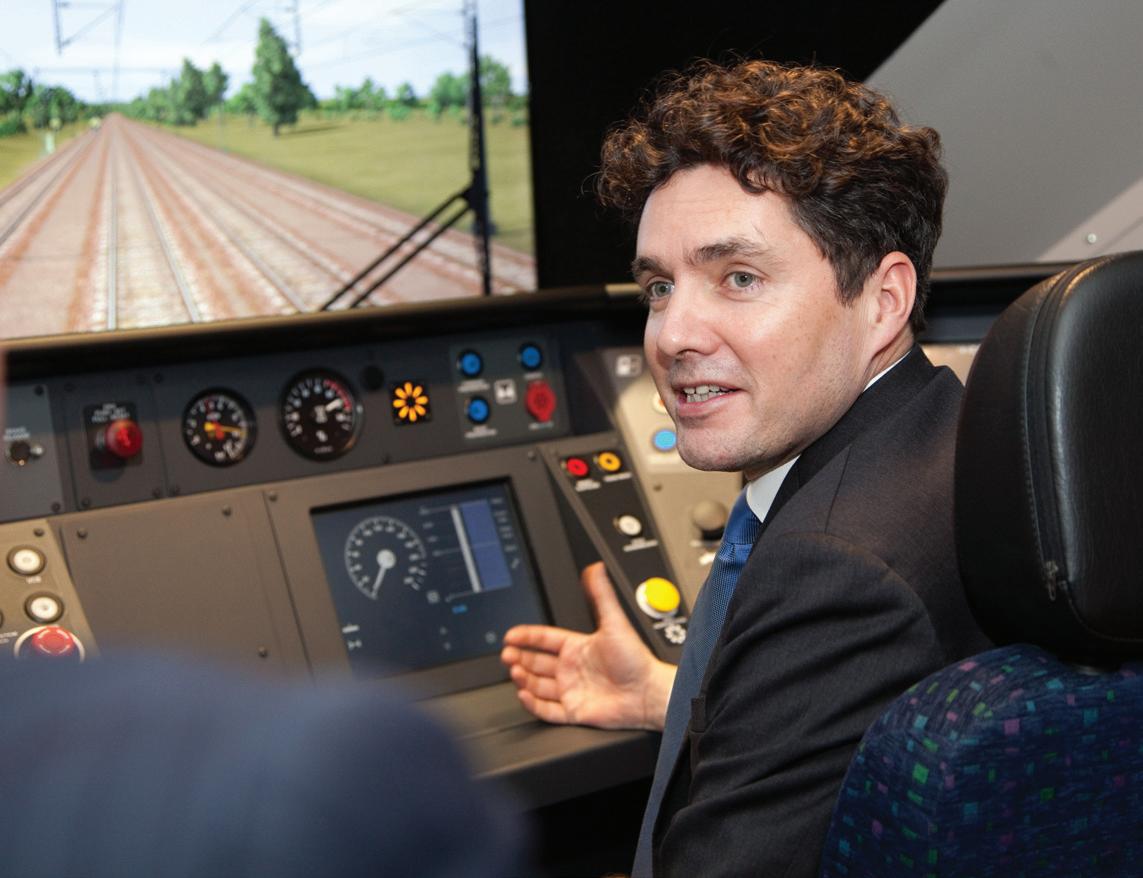
The plan, Going for Growth, confirms proposals for the creation of a new Midlands Rail Hub that would benefit 43 communities, towns and cities. Its promoter has dubbed the proposals “the biggest step possible in levelling-up the Midlands”.
“This is a truly momentous occasion for us, we are proud to unveil this detailed plan for infrastructure changes which will transform our region,” said Sir
LNR D-TRAINS
WITHDRAWN
ROLLING STOCK
London Northwestern Railway has withdrawn its three Class 230 D-Trains from service following the rolling stock supplier Vivarail falling into administration on December 1. The units had been used on services between Bedford and Bletchley and have been replaced by buses.
“Following the news that Vivarail is to enter administration, we have been left with no alternative but to pause the service as we can no longer guarantee the required level of maintenance for the trains on the route will be available,” said LNR engineering director John Doughty.
John Peace, chairman of Midlands Connect.
“We know the project has the backing of the businesses, communities and political leaders in the Midlands, and we stand ready to kickstart its delivery and get spades in the ground.”
Midlands Connect said the proposals would reduce journey times, increase rail journeys and “supercharge” the regional economy by bringing the East and West Midlands closer together.
The outline business case for the proposals has now been submitted to the government for
consideration. Midlands Connect has said that if further funding is forthcoming, it hopes to produce the full business case which would make the project ready for delivery.
The plans propose the construction of two new chords as well as 11 further engineering interventions.
The biggest are between Bordesley and Moor Street, called the West Chord, allowing access to Birmingham Moor Street from the south west and Wales, and ensuring services are improved on the Hereford and Worcester corridors. The project’s second chord is called the East Chord. This creates an access to Birmingham Moor Street from the East Midlands.
Other plans for engineering upgrades include: additional
CONSULTANTS ADVISE ON EWR
Appointment follows clarity on project’s status
PROJECTS
A Mott MacDonald-WSP joint venture has been appointed as technical partner by East West Railway Company to drive forward the next phase of the scheme between Bletchley and Cambridge. It follows confirmation in the Autumn Statement that the government intends to continue with plans for the project which will create a new railway between Oxford and Cambridge. The consultants will provide technical and management resources to support EWR Co as it prepares to apply for a development consent order.
platforms at Birmingham Snow Hill and Birmingham Moor Street, improvements around Kings Norton-Barnt Green, Stoke Works junction, a Malvern Wells turnback facility, Ledbury to Shelwick partial double-tracking, Bordesley viaduct widening, Water Orton remodelling, Nuneaton to Wigston signalling headways and freight loops between Nuneaton and Leicester.
The improvements will make space for up to 10 extra trains per hour in and out of Birmingham, leading to up to 100 extra trains on the rail network in the Midlands each day.
Midlands Connect has also highlighted some of the panregional benefits from the plans, including additional hourly trains from Birmingham to Bristol, Cardiff via Gloucester, and Hereford via Worcester. There would be an extra fast train between Birmingham and Leicester via Nuneaton and a further hourly slow service between the two cities.
Maintenance concerns after Vivarail collapse
“We stand ready to kickstart its delivery”
Sir John Peace
DIGITAL PROGRESS Rail Minister Huw Merriman visited London King’s Cross station last week to see progress with the installation of digital signalling on the southern section of the East Coast Main Line. The East Coast Digital Programme will see traditional lineside signals replaced with in-cab signalling on all rolling stock, including steam trains, using the line.
NEWS ROUND-UP 08 | 16 December 2022 www.passengertransport.co.uk
Government confirms
£44bn funding for CP7
OLR OPERATING PROFITS SLIP
£50.5m operating profit reported for FY2021/22
FINANCIALS
FUNDING
Transport secretary Mark Harper has confirmed funding arrangements for Network Rail’s Control Period 7 in England and Wales between April 2024 and March 2029 with the publication of the High-Level Output Specification (HLOS) and Statement of Funds Available (SoFA) for the period.
The SoFA confirms the government will pump £44bn into the railway over the five-year period and the HLOS also makes it clear the government intends to press ahead with rail reform. This is despite ministers appearing to have cooled on plans to create Great British Railways following public statements in recent weeks.
In his written statement to parliament, and perhaps with a nod to the recent on-going rail
RMT REJECTS LATEST PAY OFFER
INDUSTRIAL RELATIONS
Industrial action on the railway resumed this week after members of the RMT union rejected the latest pay offer from Network Rail.
The infrastructure controller had offered a 5% pay rise this year - backdated to January - with a 4% rise in 2023 and a guarantee of no compulsory job losses until January 2025. However, the deal was reported to be linked to substantial changes in working practices.
industry strike action, Harper said the government “fully recognises the critical role rail services played for business, key workers and our society during the Covid-19 pandemic, and the vital role they play in connecting communities and supporting economic growth”.
He continued: “The HLOS makes it clear that the government will press ahead with rail reform, addressing the challenges facing the sector, such as fragmentation and outdated working practices, with a strong continued focus on operations, maintenance and renewal.
“This strong continued focus is important in supporting a safe, efficient and reliable railway for passengers and freight customers.”
Commenting on the SoFA and HLOS, the Railway Industry Association (RIA) said a direct comparison with the CP6 funding settlement cannot be made
The RMT union said 63.6% of members voted to reject the offer on an 83% turnout. It claimed the pay offer was linked to substantial job losses, a 50% cut in scheduled maintenance tasks and a 30% increase in unsocial hours.
RMT leader Mick Lynch said this week there was no deal “in sight”, but said he hoped new talks with the industry could help “develop proposals our members can support”.
He claimed the rejection of the pay offer from Network Rail, which he branded as substandard, demonstrated that members were determined to take further strike
because of differences in what is included. However, it said the settlement for CP7 appeared to allow for a small increase in expenditure on operations, maintenance and renewals of the railway, in real terms.
“RIA welcomes this commitment from the UK Government, which - in difficult economic times - appears to mean Network Rail can continue maintaining and renewing the railway in CP7 with similar funding levels to today’s,” said RIA chief executive Darren Caplan.
Caplan warned that at a time of significant inflation, it is unlikely the funding settlement will cover all the investment needed and it was essential to recognise the part that the supply sector can play.
He continued: “We therefore welcome the commitment in the HLOS for Network Rail to work collaboratively with the supply chain, a consistent ask of RIA and our members in recent years.”
DfT OLR Holdings Ltd (DOHL), the state-owned parent company of train operators LNER, Northern Rail and Southeastern, reported operating profits of £50.5m in the year to March 31, 2022, down from £88.5m a year earlier, according to new accounts.
Passenger revenues totalled £961.2m, up from the Covid-ravaged figure of £180.2m a year earlier, with other revenue amounting to £1,230.7m. Operating costs were £2,141.4m (2021: £1,532.7m). Overall profits after tax for the year, including from now discontinued rolling stock leasing operations, were £22.0m, (2021: £41.7m). As in 2021, no dividend has been paid.
“During a very difficult year, when the effect of the pandemic remained significant, I must congratulate all DOHL Group employees for the way they have effectively maintained services,” said DOHL chairman Richard George. “The TOCs under DOHL ownership have played an important part in the railway response to the pandemic.”
action in pursuit of a settlement.
“The government is refusing to lift a finger to prevent these strikes and it is clear they want to make effective strike action illegal in Britain,” added Lynch. “We will resist that, and our members, along with the entire trade union movement, will continue their campaign for a square deal for workers, decent pay increases and good working conditions.”
Network Rail chief executive Andrew Haines said the RMT leadership needed to “think long and hard about what to do next”. “Further strike action will cause further misery for the rail industry and for their members who will lose pay,” he said.
“This news is especially frustrating given that we learnt today that colleagues represented by Unite union have accepted the very same offer put to RMT members. The RMT are the outliers here. They need to stop playing politics and work with us to bring this dispute to an end.”
Haines noted that the ballot suggested there were “clearly” a significant number of Network Rail staff who are in favour of the proposed deal.
“Our offer, which is worth over 9% with a guarantee of compulsory redundancies and no changes to anyone’s terms and conditions, remains on the table,” he added.
www.passengertransport.co.uk 16 December 2022 | 09
Haines urges union to ‘stop playing politics’
HLOS outlines NR funding plans and commits to reform
“The HLOS makes it clear that the government will press ahead with rail reform”
GM reveals plans for 50 more electric buses
Transport for Greater Manchester is expected to order a further 50 zeroemission that will be introduced with the second bus franchise area in 2024
VEHICLES
Transport for Greater Manchester is poised to order a further 50 zero-emission battery-electric buses as part of its rollout of bus franchising across the region.
The move follows an order for 50 Alexander Dennis Enviro400EVs for use in Bolton and Wigan, the first area to be franchised. The second batch of 50 buses will be deployed in 2024 in the Tranche 2 area, covering the north-east of Greater Manchester.
Funding has been secured for the vehicles from Greater Manchester’s City Region Sustainable Transport Settlement and TfGM has said work is underway to develop a delivery plan for the deployment of the additional zero-emission buses that will be funded from Greater

Manchester’s CRSTS fund allocation and local sources.
In an update to combined authority members last week,
TfGM aims for early rail integration wins
Transport for Greater Manchester has opened a dialogue with the Great British Railways Transition Team (GBRTT) in a bid to integrate local rail services into the emerging Bee Network.
Steve Warrener, TfGM’s managing director, told members on the Greater Manchester Combined
Authority’s transport committee last week that one key area of focus for these discusssions is ticketing. He revealed joint working arrangements have been established to explore introducing ‘pay-as-you-go’ contactless payment and capping, as well as rationalising the number of ticket products available and simplifying the approach to tickets offered on
Steve Warrener, TfGM’s managing director, revealed Stagecoach Manchester has been commissioned to lead
certain routes.
“TfGM will also be working with GBRTT over the longer term on rationalising fare bands within Greater Manchester, improving the retail experience, expanding the availability of easy-to-use multimodal tickets and improving the offer to the wider Greater Manchester ‘travel to work’ area,” he added.
Meanwhile, Warrener said TfGM was working with partners in a bid to tackle the current poor performance of the local rail network.
on the design, development, construction and commissioning of a zero-emission bus depot in Stockport.
The operator will also lead on the procurement of 170 zeroemission buses which will be funded by the government’s Zero Emission Bus Regional Areas (ZEBRA) scheme. It is expected an order for these vehicles will be placed in March 2023, for delivery by May 2024.
Meanwhile, at the same meeting Warrender said TfGM is currently in the process of negotiating to acquire the bus depots it has identified as strategically important for bus franchising and from which the 10 large franchises will be operated when the process to franchise Greater Manchester’s buses is completed in 2025.
In addition to negotiating the acquisition of the existing depots for Tranche 1 in the Wigan and Bolton areas, Greater Manchester Combined Authority has acquired land at Martland Park to build a new depot if an agreement cannot be reached to acquire the Wigan and Bolton depots of Stagecoach and Rotala subsidiary Diamond Bus North West (PT274).
Meanwhile, Greater Manchester mayor Andy Burnham told the same meeting that he is keen to expand the current capped bus fares scheme for single and daily tickets to weekly tickets. He revealed that in the first three months of the scheme, uptake of the capped single and daily fares had been significant. Burnham said this had been driven by both switching from more expensive products, and also by additional trip generation.
“The net result is that existing bus users are making savings on the cost of their bus travel whilst also attracting more occasional users to bus,” he added.
NEWS ROUND-UP
TfGM ordered 50 ADL/BYD Enviro400EVs earlier this year
10 | 16 December 2022 www.passengertransport.co.uk
Talks with GBRTT seek to explore rail ticket simplification
WMCA warns on Metro project costs
Flagship light rail expansion plans could be at risk
FUNDING
A number of major public transport projects in the West Midlands are now believed to be at risk as a result of delivery delays and sharp increases in the cost of construction, according to the West Midlands Combined Authority.
It is understood that some of the projects affected include planned extensions of the West Midlands Metro light rail system to Birmingham’s Eastside, the much delayed short extension to Wolverhampton Interchange and the Dudley to Brierley Hill element of the planned Wednesbury to Brierley Hill extension.
Ian Martin, WMCA’s director of commercial and investment, told members this week that all three of these projects had now been
assigned a red status, indicating there was a risk completion dates would be missed.
Meanwhile, Anne Shaw, executive director of Transport for West Midlands, raised further concerns with the news that three unidentified projects would require an immediate “uplift in budget totalling £17.8m”.
While TfWM has not publicly identified the projects, local media have suggested that £10.8m has been allocated to the 700-metre Wolverhampton extension.
Shaw added that in addition to the pressures on these three projects, there are a number of cost escalation ‘early warnings’ which are considered highly likely to mature into an actual cost pressure to some degree over the short to medium term.
“The total value of the immediate and early warning matters equates to £171.1m,” she revealed. “It is expected this maximum exposure can
TfWM warns bus costs are increasing
Patronage below 2019 levels as costs exceed them
Transport for West Midlands has warned that while bus patronage continues to recover across the region, inflationary pressures are now having a significant impact on bus costs.
Pete Bond, TfWM’s director of integrated transport services, told members last month that bus patronage in the West Midlands was now around
86-88% of pre-pandemic levels, showing a slow but steady recovery. However, he warned members that costs of operations were now around 120% of prepandemic levels (including fuel and driver pay) and set to increase further.
Meanwhile, following consideration of an outline assessment of bus franchising
be mitigated to £85.9m subject to the effectiveness of specific mitigations.”
Shaw added that these sums excluded the costs needed to address the Dudley to Brierley Hill extension and confirmed the future of that project will be examined in a report at WMCA’s February meeting.
“This report will address the funding position for the extension following an earlier report which agreed a number of funding options which would be pursued to support this scheme’s delivery in full,” she said.
Shaw said that while WMCA has been successful in gaining significant government funding, it is heavily constrained in terms of the discretion it can exercise over its capital spending. “Transforming Cities Fund is the only pot of funding which was fully devolved to the region for local leaders to make the ultimate investment decisions,” she added.
IN BRIEF
LANCASHIRE BUS BOOST
Improvements to a small number of evening and weekend bus services in Lancashire were introduced at the end of last month as a result of Bus Service Improvement Plan funding.
The investment is the first phase of a £34m programme by Lancashire County Council and Blackburn with Darwen Council “to make buses the best travel option for more people” as part of their joint BSIP submission.
The enhancements have been introduced on key corridors where the partners say there is strong bus patronage in the daytime but where evening and weekend connections were limited or non-existent previously.
METROLINE GOES ELECTRIC
earlier in 2022, Bond told members work has now commenced on a full assessment of bus franchising “to determine whether this might prove a more effective way to achieve the combined authority’s bus policy objectives in the future compared to the current partnership model”.
“This work is being undertaken in line with the rigorous processes set out in the Bus Services Act 2017 and is likely to conclude in 2024,” he noted.
London bus operator Metroline has placed two significant new electric bus orders. The ComfortDelGro subsidiary has confirmed an order for 48 Volvo BZL battery-electric single deckers which will enter service during the second half of 2023. It is the largest order the Swedish manufacturer has signed for the new BZL model. Meanwhile, the operator has also ordered 39 StreetDeck Electroliner batteryelectric double deckers from Wrightbus.
ANGER OVER FARE RISES
South Yorkshire mayor Oliver Coppard has blasted local transport operators over plans to increase the cost of the Travelmaster range of multioperator and multi-modal tickets. “This is yet more evidence that our public transport system is broken, and we need to see transformational change here in South Yorkshire,” said Coppard.
www.passengertransport.co.uk 16 December 2022 | 11
Station not included in Grand Union approval
Grand Union Trains will launch its new open access service to Carmarthen in 2023, but a planned new station is not included in its commitments
OPEN ACCESS
The proposed construction of the first new station by an open access operator is not included in the commitments Grand Union Trains (GUT) is required to deliver as conditions of its new rights to operate between London and Carmarthen. However, GUT intends to make a separate application to the Office of Rail and Road for rights to call at its proposed Felindre station, north of Swansea.
GUT had applied for rights to operate the Carmarthen service for 20 years, based on its proposed investments in new rolling stock, construction of Felindre station and improvements at Severn Tunnel Junction station. On December 1, Stephanie Tobyn, the ORR’s director of strategy, policy and reform, informed GUT that the company would be given access rights for 10 years only and
INVESTMENT PLANS
INVESTMENT
Transport for London has published its draft business plan that outlines how it will achieve operational financial sustainability by 2023/24, rebuild its finances and deliver significant levels of investment.
It plans to invest £8.1bn in London’s road and rail network, as well as funding to boroughs provided for investment in their streets.
without rights to stop at Felindre and Cardiff Parkway stations.
Construction has yet to commence on Cardiff Parkway, east of the Welsh capital. The Welsh Government, which has agreed to provide some of the station’s funding, has called in the planning application.
Tobyn said that the ORR case team and GUT had discussed the need for additional evidence for approval of rights lasting for 20 years which would include serving as-yet unbuilt stations. “Grand Union was willing to accept a decision with 10 years of access
rights,” she said.
GUT had advised the ORR it intended to apply separately for additions to its access contract for calls at Felindre and Cardiff Parkway stations. “This supplemental application would have to go through the standard legislative and ORR access application process, once submitted,” Tobyn said.
Ian Yeowart, GUT’s chief executive, told Passenger Transport that Felindre station was tied to an extension of the contract and discussions were ongoing with the ORR. “It is an important part of the overall service plan,” he said. “It will be available to all operators when built.”
For 10 years from December 2024, GUT will be able to operate five return trains per day between London Paddington and Carmarthen, calling at Bristol Parkway, Severn Tunnel
Public transport investment includes new trains for the Piccadilly line and Docklands Light Railway, the completion of the modernisation of the sub-surface London Underground lines, replacement of the original tram fleet in Croydon and subject to long-term certainty on government capital funding, the start of investment in new Bakerloo line trains and new signalling on the Bakerloo and Piccadilly lines.
TfL also plans to expand the Ultra Low Emission Zone to the whole Greater London area, fund the decarbonisation of TfL operational
buildings and offices, as well as continued investment in reducing emissions from bus fleets.
The plan will also see TfL continue to progress its Vision Zero action plan, Bus Action Plan and Bus Safety Standard, as well as invest in improvements to its advertising and retail estate.
Work will also be undertaken to support the first phase of a new entrance and ticket hall at Elephant & Castle station, which is being funded by third parties.
The Silvertown Tunnel will also be completed, and separately TfL
Junction, Newport, Cardiff Central, Gowerton and Llanelli. Gowerton is on the main line west of Swansea. GUT would be able to run its trains on the chord north of Landore depot to avoid reversal in Swansea, where it does not have rights to call. GUT’s aspiration is to operate via the Swansea District Line, north of the city. Felindre station would be on that line and would replace the Gowerton stop.
GUT’s service will provide faster travel to London from Carmarthenshire and from Severn Tunnel Junction, where Great Western Railway’s London trains do not call. GUT plans to invest in enhancements at Severn Tunnel Junction, including improved access from the nearby M4.
The Welsh Government, Transport Focus, local authorities and Welsh Conservative MSs (Senedd Members) told the ORR that they supported GUT’s application. GWR, the Department for Transport and Network Rail objected, but the ORR decided that GUT’s proposals passed its “not primarily abstractive” test on revenue and that GUT’s trains would not have a significant detrimental impact on Great Western Main Line performance.
has commenced a consultation on a new bus network that will use the public transport lanes in the tunnel. They include a new limited-stop Route X129 between Grove Park and Canary Wharf; and extension of Route 129 (Lewisham - North Greenwich) to Great Eastern Quay via the Royal Docks.
Commenting on the business plan, Andy Lord, London’s transport commissioner, said: “Now London is emerging from the pandemic, and we have funding certainty into 2024, we can once again look to the future with optimism.”
Business plan sets out plans to invest £8.1bn
TfL REVEALS ITS
NEWS ROUND-UP 12 | 16 December 2022 www.passengertransport.co.uk
“Grand Union was willing to accept a decision with 10 years of access rights”
Harper hints at more bus recovery funding
Transport secretary suggests additional funds could be made available for buses in England beyond the end of the Bus Recovery Grant in March 2023
FUNDING
Transport secretary Mark Harper has said he wants to make sure the government continues to fund buses in England beyond the March 2023 end date for the Bus Recovery Grant (BRG).

Speaking at an evidence session of the parliamentary transport select committee on December 7, Harper said he was “very well aware” of the financial support that has been given to the sector since the Covid-19 pandemic receded.
“We have been specifically focused on that,” he said. “Those [funding streams] run out at the end of March. I am very clear that I want to make sure we can continue supporting bus services.
“One of the things I have tasked my team with as we work through the financial settlement from the Autumn Statement is to work out the right level of support the Department needs to continue providing for buses and what things we need to continue doing. The absence of having said something today should not, I think, be read either way. I am very conscious that we will need to say more about buses in the near future.”
When probed by Stoke-onTrent South MP Jack Brereton about whether it was the government’s ambition to get bus ridership above pre-pandemic levels, Harper said there was an intention “to grow bus ridership higher than it is at the moment and, clearly, get it back to the sort
of levels we were looking at”.
“That is why, with the Bus Service Improvement Plans that we have been doing, we have tried to encourage local authorities to have ambitious plans to grow bus ridership,” he said.
“It’s one of the things I briefly talked about when I talked to northern mayors on my visit. I had some very good conversations with Andy Street about his plans for buses in the West Midlands.
“I am very keen that we work with local authorities that have ambitious plans on growing bus ridership, and also look at different
models. One of the advantages of devolution is that we can look at different ways of managing bus services in different areas.”
Harper added he wanted to make it easier for people to use buses and also make it easier to integrate with other modes. He said this would “give people more choice”.
When probed by West Dorset MP Chris Loder about the issue of rural public transport, Harper said it was clear from the Bus Service Improvement Plan process “there is a lot of unfulfilled demand”.
“People had bid and had quite ambitious plans for Bus Service Improvement Plans that we could not fund,” he added. “I am very conscious, as we work through our Autumn Statement work, that I want to ensure we have an appropriate level of funding for bus services in the future.”
BUS PASSENGER SURVEY REPLACED
PASSENGER EXPERIENCE
Transport Focus will soon be launching ‘Your Bus Journey’, a new survey which measures passenger satisfaction with bus services. It will replace the Bus Passenger Survey. The new survey will help identify where future improvements in journeys for bus passengers can be made. Transport Focus will be asking passengers across England and Scotland about their experiences to provide robust, comparable and benchmarked results.
Your Bus Journey data will be collected continuously throughout 48-50 weeks of the year, giving regular headline measurements along with more detailed journey feedback from passengers.
Since September, Transport Focus has been talking to local transport authorities and bus operators about the benefits of the survey. This will include how results will help frame the targets that partnerships set for their Bus Service Improvement Plans, Enhanced Partnerships and potentially, longer term, in franchised bus areas.
Over time Transport Focus will provide rolling headline results by month using an online data tool to make sure industry partners know the key issues. The transport user watchdog will also be able to report weekly verbatim feedback from passengers meaning that they will continuously have their voices heard.
In addition, results will be summarised and reported at both a six monthly interval along with a full set of annual reports.
Nearly 35 partnership and operator only areas have so far committed to the 2023 survey. It will represent the experiences of around 35,000 bus passenger journeys across areas of England and Scotland.
www.passengertransport.co.uk 16 December 2022 | 13
“I want to make sure we can continue supporting bus services”
Mark Harper
Mark Harper appearing before MPs on December 7
‘Your Bus Journey’ will monitor user satisfaction
“I am very conscious that we will need to say more about buses in the near future”
TOCs with new diesel trains face challenges
Train operators must eventually find better ways to fuel trains
DECARBONISATION
Train Operating Companies which have ordered large numbers of new diesel trains face challenges in decarbonising their fleets later, a senior TOC manager has suggested.
Northern, West Midlands Railway and Transport for Wales are among the TOCs which have introduced, or are in the process of introducing, hundreds of new diesel units since the UK committed to emitting net zero greenhouse gases by 2050. Other TOCs have introduced diesel/electric bi-mode units, further fleets of which are under construction for East Midlands Railway and Avanti West Coast. Most trains are designed for a useful life of 25 to 35 years.
Colin Lea, TfW Rail’s planning and performance director, told a Transport Focus board meeting that modal shift away from the car was the first target for decarbonising transport. TfW was enhancing train service quality
ZERO EMISSION BUSES ‘COULD
LURE MORE USERS’
ZERO EMISSION BUSES
Buses powered by electric or hydrogen batteries could lure millions of additional passengers onto public transport according to new research into public attitudes
and capacity between Cardiff and Manchester, its highest revenue route, including introducing First Class accommodation. Even a small percentage increase in train journeys from reduced car journeys would make a useful contribution to reducing transport greenhouse gases in Wales and the Borders, he said.
Commenting on fleet decarbonisation, he said: “That is really difficult for us in Wales because we have so little electrification. So thinking about new technologies - potentially hydrogen and these kinds of things - having just bought a big fleet of diesel trains - is a real challenge for us, and it’s one I think we will keep coming back to in the next few years, as to how we are going to decarbonise.
“At the moment, getting as many people modally shifted from car to train or bus etcetera is the crucial
lever but we will soon move to a point of, ‘Well actually, we’ve got all these diesel trains, that’s carbon too - let’s see if we can find a better way of fuelling our trains’.”
The only electrified railway in Wales is from the Severn Tunnel to Cardiff. In 2017, the UK Government, which has not devolved Welsh rail infrastructure, cancelled electrification to Swansea and Bristol Temple Meads. This precludes the use of electric trains for local services into both cities.
TfW is electrifying the devolved part of the Valley Lines but since no electrification is planned for the non-devolved part, a new fleet of 24 battery/electric/diesel trains from Stadler is being delivered. The diesel engines will enable through services to continue to operate, for example from the non-electrified Penarth line to the electrified Rhymney line.
TfW has also ordered 77 Diesel Multiple Units from CAF and 11 from Stadler. Like their Greater Anglia cousins, the Stadler units have engines in a power pack vehicle where the modular design allows for future conversion to battery/diesel or battery/overhead electric hybrids.
Retrofitting older diesel stock is proving to be a slow process.
TfW bought five three-car sets of former London Underground trains from Vivarail for service entry in May 2019. The former electric trains, converted to battery/diesel hybrids, required further modifications this autumn and have yet to enter service.
In February, Chiltern Railways introduced its first hybrid battery/ diesel train, a converted Class 168 DMU, following several years of development work on hybrid retrofit technology.
Of the TOCs which currently operate large numbers of diesel trains, only ScotRail has a pathway to decarbonisation. ScotRail is preparing to order electric and battery/electric (BEMU) trains to replace most of its legacy diesel fleet. Strategic sections of railway are being electrified in preparation. The BEMUs will draw overhead power on part of their routes, and the remaining non-electrified sections will be within the batteries’ range.
towards travel.
Research by ComRes for Go-Ahead Group’s Zero Emission Centre of Excellence has found that only 26% of the public view bus travel as a ‘green’ form of transport - on a par with rail travel, but well below the number who view cycling or walking as ‘green’.
However, if they are specifically told that a bus they are catching is powered by an electric or hydrogen fuel cell battery, the proportion who
view it as a green form of transport rockets to 81%.
Contrary to received wisdom in the public transport industry that ‘green’ buses don’t sell any more tickets, 55% of respondents said that they would be more likely to travel by bus if they knew that a zero emission bus was available. This raises the prospect of a significant increase in bus travel as the UK’s 30,000-strong bus fleet transitions from diesel fuel to electric or
hydrogen power.
The polling was carried out on behalf of The Go-Ahead Group’s Zero Emission Centre of Excellence, which officially opens today.
The centre, which is based in London, brings together expertise from Go-Ahead’s bus companies across the UK, Ireland, Sweden and Singapore and will develop best practice in buying, running and maintaining zero emission buses.
14 | 16 December 2022 www.passengertransport.co.uk ENVIRONMENT
81% of people see zero emission buses as ‘green’
“Thinking about new technologies ... having just bought a big fleet of diesel trains is a real challenge for us”
Colin Lea, Transport for Wales Rail
TfL celebrates decade of contactless payment
Since it was first introduced in December 2012, 2.5 billion bus journeys have been made using pay as you go with a contactless bank card or device
TICKETING
Transport for London is marking 10 years since contactless payment using a bank card was first introduced as a new way to pay on London’s buses, making it easier and more convenient for millions of customers.
The system, which evolved from TfL’s successful Oyster card system and was developed in partnership with the wider banking industry, allows customers to benefit from the ease and convenience of using their contactless bank card or mobile device, rather than having to pre-purchase anything. The system also allows for daily and weekly capping, meaning customers never pay more than the equivalent seven-day ticket.
On its first day, only 2,061 customers made 2,586 bus journeys using contactless bank cards, although this was impressive given how few of the cards were in general circulation. Since then, the popularity of contactless, both as a means to pay generally and also as a method of paying for travel, has risen exponentially.
A year after launching, TfL had seen more than 6.5 million journeys (around 33,000 bus journeys a day) being made using a contactless payment card. By December 2017, more than half a billion journeys had been made, with TfL seeing around 900,000 bus journeys a day made using contactless.
Following the pandemic, bus ridership is now at around 80-85%
of pre-pandemic levels, with more than five million journeys a day being made - with around 1.7 million of those made using pay as you go with contactless.
Around 70% of all pay as you go journeys on buses are made using contactless payment cards or mobile devices - with the most popular bus route for contactless use the route 149 from London Bridge to Edmonton with around 100,000 contactless taps a week.
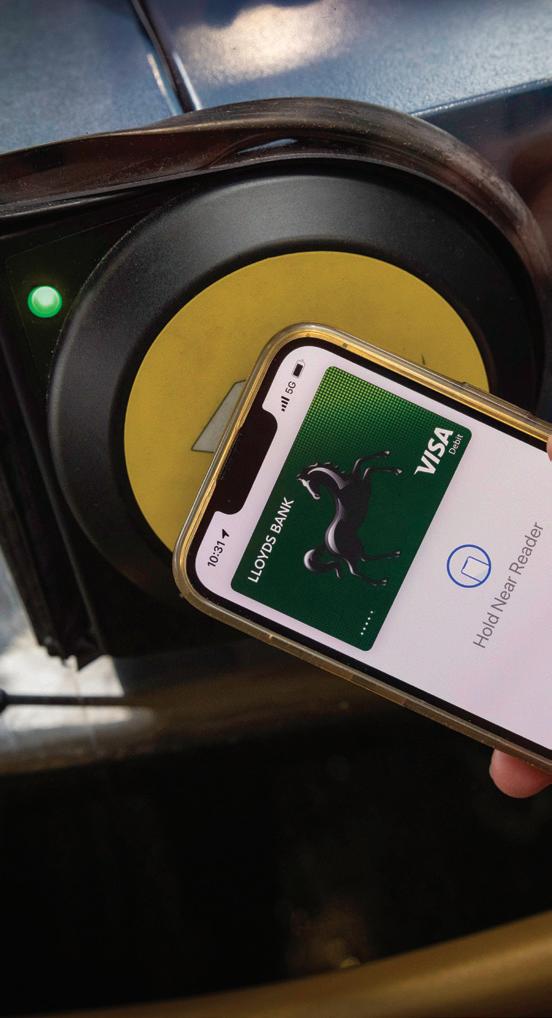
In September 2016, the introduction of the mayor’s ‘Hopper’ fare, which offers
unlimited bus and tram travel, within an hour of first touching in, for the price of a single fare, helped further increase contactless use. Since then, more than 770 million Hopper fare journeys have been made using contactless payment and Oyster cards on buses and trams across London.
TfL’s development of contactless payments is seen by many as the catalyst for contactless being adopted more generally by consumers across the world, as well as in the UK. The huge success of pay as you go with contactless in London has led to other cities across the world such as New York, Chicago and Sydney having now introduced contactless payment options for public transport based on London’s system.
Norman Baker, director of external affairs at Campaign for Better Transport, commented: “Contactless is the way forward and TfL has led the way. It is undoubtedly the case that the introduction of contactless, following on from the hugely successful Oyster card, will have pushed up the numbers using public transport, which is exactly what we at Campaign for Better Transport want to see. And confidence in the system is such that people believe with good reason that they are being charged the right fare without ever having to check.
“As soon as we can see similar commitment in our other major cities in England, the better.”
£1.8M
FOR TECH START-UPS
Ambition is to ‘build a tech base for the future’
RESEARCH & DEVELOPMENT
Transport technologies of the future could be brought to life through a new round of government funding, launched this week.
As many as 60 projects could be awarded a share of the £1.85m fund to develop early stage research projects designed to support innovative ideas to create a better transport system. The programme aims not only to foster innovation to improve transport in the UK, but also to generate growth in the sector.
Previous winners include:
A trial using a drone in remote areas to help emergency services find missing people;
A project exploring 3D technology to help visually impaired people use public transport;
The development of magnetic technology to improve reliability of rail services in rain and snow.
Transport and decarbonisation minister Jesse Norman said: “AI rescue drones, magnetic train tech, and sensors to help visually impaired people are just some of the cutting-edge transport projects this programme has already funded.
“We’re determined to support path-breaking R&D across the UK. This new round of funding is designed to find the next top tech projects that will improve transport for millions across the UK.
“By aiming at emerging start-ups and small businesses we can ensure we build a tech base for the future.”
The TRIG 2022 programme will have five targeted funding calls, alongside an ‘open-call’. Specific areas of focus include: maritime decarbonisation; future of freight; local transport decarbonisation; transport resilience to severe weather and flooding; improving the rail passenger experience.
www.passengertransport.co.uk 16 December 2022 | 15 INNOVATION & TECHNOLOGY
“Contactless is the way forward and TfL has led the way”
Norman Baker
Around 70% of all pay as you go journeys on buses are made using contactless payment cards or mobile devices
JONATHAN BRAY
If you come at King Car, don’t miss
referendum not a single Manchester District voted in favour. Overall it went down four to one. The chair of Greater Manchester PTA, Roger Jones, who led the campaign for the charge, lost his seat to a local micro party that opposed it.

And now in 2022 we have seen Leicester back off its workplace parking levy plan in the face of a trade union-led campaign - as well as local uprisings in London against Low Traffic Neighbourhoods (despite LTNs being predicated on the relatively innocuous and well established idea of reducing traffic in residential streets).
On September 8, 2000, the Stanlow Refinery in Cheshire was blockaded by Farmers for Action protesting about the cost of fuel. Two days later fuel protesters were on site seeking to shut down six of the country’s nine oil refineries and four oil distribution terminals, triggering panic buying. Just six days after the protests began most fuel supplies were down to 5% of normal levels and thousands of petrol stations were closed. Food supplies to supermarkets were under strain and the blue light services were also running low. The protests started to wind down at that point as the real life consequences of the protesters absorption and bravado started to dawn. If any other protest group had taken direct action in pursuit of their own interests to bring the country to its knees the police would have put a stop to it, using whatever force they felt necessary. But the state kept the kid gloves on and drew a conclusion that is still held.
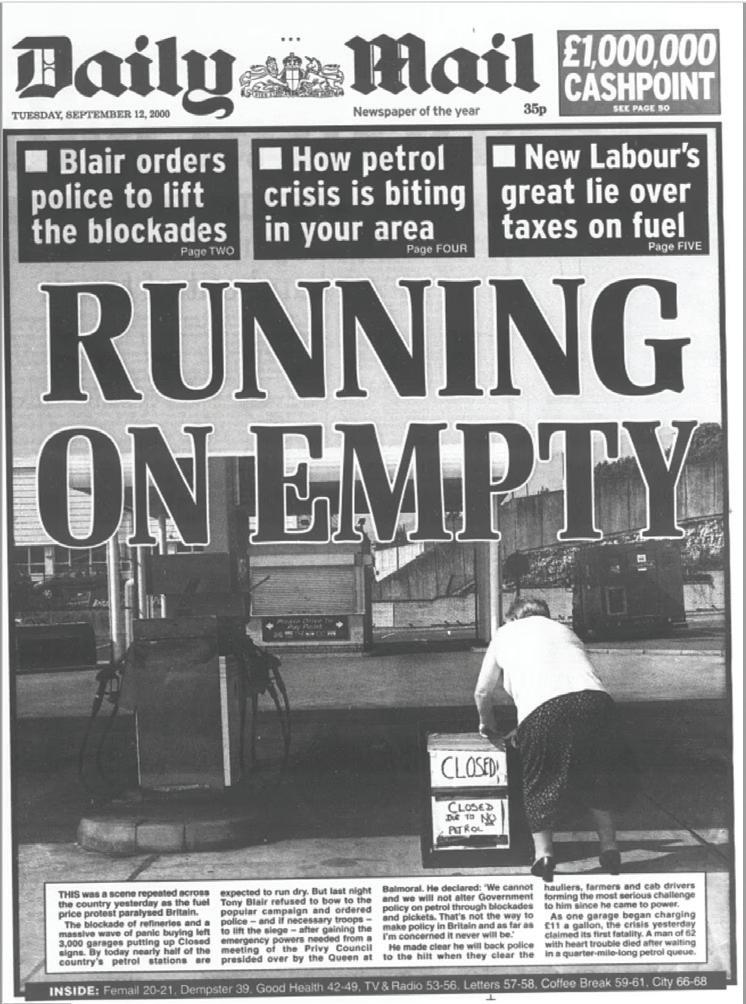
Meanwhile, in the early 2000s the economists had decided that congestion charging was the answer to everything - after all, on paper it looked so grown up and neat. Mayor Livingstone had made it work (though they tended to forget that Tony Blair attacked Livingstone at the time for doing so). But once Ken had done it all the terribly clever people in London agreed with each other that congestion charging would be the one and only idea that was worth spending their valuable time entertaining for transport policy outside of London.
Significant funding for cities then became predicated on introducing a congestion charge. Greater Manchester went for it with a £3bn package of transport funding including Metrolink extensions and a BRT system. This was dependent on a road pricing scheme which would charge £2 for vehicles in the peak entering the area bound by the M60 motorway with a further £1 for those entering an inner cordon, roughly corresponding to the Manchester Inner Ring Road. It went down badly with the public - very badly. In the
All of these episodes have a scarring effect. They lead to conclusions being drawn. They contribute to the political and media folk memory that you take on motorists at your peril. They tell you that you are more likely to lose than you are to win and that your political capital is better spent elsewhere.
Having said that, and despite all the big defeats, there has been progress. Charging for road use isn’t the norm but it is becoming more common (mostly in relation to air quality). In London it’s rippling outwards from the central core. In Birmingham its established itself in the central core.
A string of recent reports suggests that a critical mass of the public is ready to listen, prepared to be persuaded and open to doing a deal between their own interests and the wider public one.
For example, Stagecoach’s recent report, Every journey makes a difference, found that the majority of motorists are open to using their car less and most motorists (51%) want councils to take action to encourage people away from using their cars.
A report for Campaign for Better Transport found that 49% of respondents supported the idea of pay-as-you-drive, after arguments for and against were discussed, while only 18% opposed it.
In their 2022 Commuting Census, Mobilityways found that the vast majority of commuters (81%) would consider an alternative to their current mode.
However, all of these hypothetical aspirations can easily mutate into actual opposition. Firstly through fear - and then loathing - of actual initiatives designed to reduce car use. These initial fears can also all too easily be sucked into a culture war frenzy
are increasingly willing to hear the case for car constraint, but wishful thinking and factual argument won’t be enough
People
Backlash: The September 2000 fuel protests
16 | 16 December 2022 www.passengertransport.co.uk COMMENT
leading people to take positions which harden into existential pitched battles that keep their protagonists hooked on Twitter.
This brings us to one of the current frontlines on traffic reduction - Oxbridge. Both Oxford and Cambridge are now advancing some radical plans for traffic restraint linked to public transport expansion. At the recent Bauer smart transport conference in London, Oxfordshire’s transport lead, Cllr Charlie Hicks, showed he is well aware that motorists cautious support in principle can soon be blotted out by fear of the unknowns that attach themselves to particular propositions. And unless this is avoided there will be trouble ahead for Oxford whose traffic restraint initiatives are made up of overlapping plans for a Workplace Parking Levy, an extension of the Zero Emissions Zone and traffic filters.
There’s a realisation that you need to engage with both sides of the brain. That’s why Hicks has behavioural scientists, advertisers and human psychologists in the room when key decisions are made. And why he commissions representational polling to ensure that the loudest voices don’t dominate the discourse.
There’s also a realisation that you need to be alive to fairness. On whom do the costs and benefits of schemes fall? And how do you factor that into the details?
Interestingly, Cllr Hicks also made the point that - psychologically - relying on bus service improvements to sell traffic restraint isn’t enough of a carrot. Improvements to the urban realm need to be part of it too because this speaks more directly to people about the kind of place they want to live in.
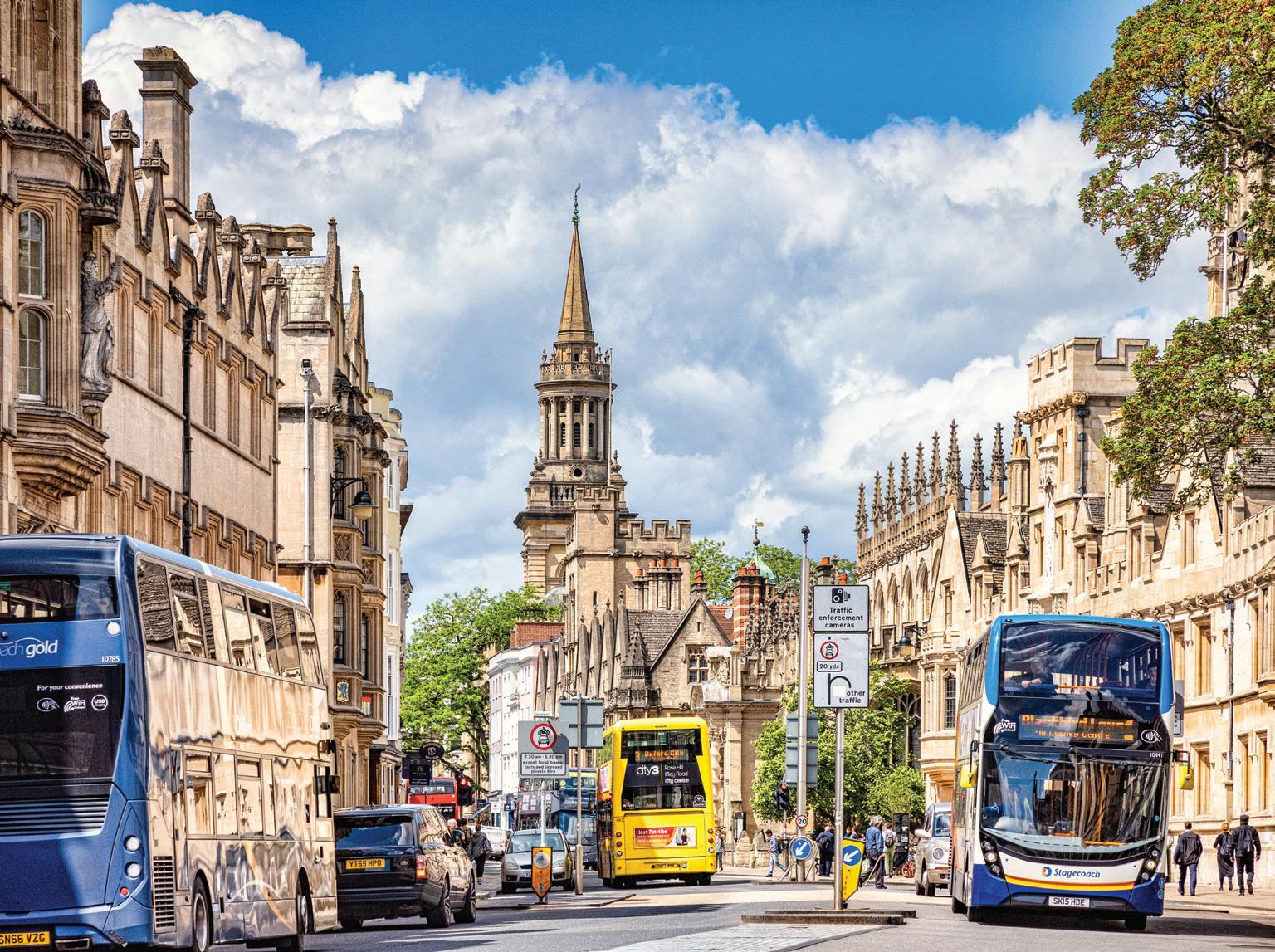
These were themes that also came up at the recent Local Transport Summit in Cardiff. David Lucas from Atkins said that neighbourhood design (including reorganising street space to prioritise more sustainable modes) is primarily a communications issue. There was disappointment from some consultants about too many one dimensional briefs for bus priority schemes that are missing the bigger picture about how to ensure these schemes will also make streets that people want to be in, and thus get public support.
The need to take people with us is a theme that I’ve also heard recently from ministers and officials. How do we take people with us on this journey to the single macro objective of net zero as well as the multiple micro
objectives of better streets?
All of this raises the question of whether the transport sector (traditionally dominated by hard engineering and a quasi-military heritage) needs to move more into the persuasion game and take on, and take seriously, those with skills in those arts that traditional transport folk might lack.
If we are going to make the frighteningly rapid progress we need to cut carbon from transport - we will also need leadership alongside persuasion skills. This is something that was amply displayed by the deputy minister for climate change for the Welsh Government, Lee Waters MS at the Local Transport Summit.
In his speech he illustrated the urgency of the task ahead by pointing out that the Cardiff Bay hotel, where the conference was being held, would be one of many around the world that would be underwater if we fail to act decisively on climate change.
Waters was clear that he was putting some markers in the ground on ambition
for Wales (including bus franchising, 20mph neighbourhood speed limits, a roads programme freeze and review). All good in themselves but also designed to deliver the message to the system that this isn’t about fiddling in the margins of the existing status quo - it’s about a fundamental rewiring of transport policy and practice.
Water’s speech was well received at the conference - but it’s those staying in the rest of the hotel that will need to be persuaded; the hotel (though not yet surrounded by seawater) was an island in a sea of car parks and dual carriageways. The hotel reception for a hotel serving the capital city of Wales assumed you had come by car. The task we face is formidable and it’s going to take both leadership and the persuasive arts. Wishful thinking and factual argument alone will not be enough. Because as recent history has shown - if you come at King Car you’d better not miss.
ABOUT THE AUTHOR
Jonathan Bray is the director of the Urban Transport Group. Throughout his career in policy and lobbying roles he has been at the frontline in bringing about more effective, sustainable and equitable transport policies.
“A string of recent reports suggests that a critical mass of the public is ready to listen”
Oxford has radical plans for traffic restraint
www.passengertransport.co.uk 16 December 2022 | 17
“The task we face is formidable and it’s going to take both leadership and the persuasive arts”
ALEX WARNER
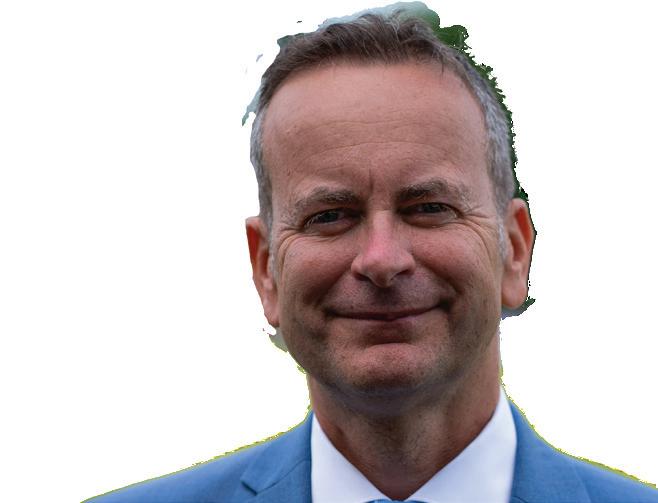
The great scenic journey opportunity

Last month I set up ‘Great Scenic Journeys’, which will be a single, multi-modal portal to market and accredit scenic transport routes
As we brace ourselves for the coldest snap in recent memory and with rail and other strikes paralysing our nation, a travelling salesman, spiv, Del Boy or south London barrow boy (all of whom I have been described), coming to talk to transport operators about the open top bus services and summer seaside sojourns might be as welcome as watching endless repeats of Harry Kane’s failed spot kick. Those blissful visions of being whisked round the Jurassic Coast with a Mr Whippy or watching the sun set late at night over Dartmoor on a First Bus seem distant during these barren times. They’re months away and we’ll cross that bridge when we get there, I hear you say!
The transport industry needs to reinvent itself to generate new income, unlock new markets in this post-Covid era and make the very best of one of its greatest assets - the stunning scenery it passes through. It was in the long hot, pandemic-riven summer of 2020 when I took my love affair with passing days on transport to a new level. Engaged by the forward-thinking First Bus to talk to customers and non-users to determine what would entice them to make a holiday in Devon and Cornwall with a journey on a bus as the epicentre of the vacation, we spoke to drivers as well. With all that feedback and collective insight we created ‘Adventures by Bus’, a collection of strongly branded products for the incredible routes run by First in the south west. The drivers created each brand personality as part of our ‘Delight the Customer’ training and we embarked on a
customer service transformation. My sceptical teenage daughters tried it out, loved the experience and posted a TikTok that garnered thousands of ‘likes’ following their trip on the Land’s End Coaster.
Then, having never visited the Lake District, I spent some time researching how to make this happen, for a non-car driver, such as I. I stumbled across Stagecoach Lakes - a truly jaw-dropping experience, overseen by the hugely impressive managing director, Rob Jones. It was so compelling, I wrote an article in Passenger Transport about my trip (PT247).
Last month, with my business partner, the illustrious Giles Fearnley, and a couple of youthful entrepreneurs, Luke Bodin and Andrew Penn, I set up ‘Great Scenic Journeys’.
Our ambition is to create for early 2023, a single, multi-modal portal to market and accredit (from a customer service perspective), the collection of scenic transport routes across the UK and beyond. The rationale is to encourage customers with a penchant for a particular leisure genre to try one route and then another, made easy by us creating itinerary suggestions, tie-ups with destinations, super-imposing walks and other ‘things to do’ en route.
We also want to help operators transform their existing services into genuine tourism experiences through a variety of services from specialist training to field marketing in the community, customer service action plan creation and much more, making them the reason why, for instance, someone might visit Cornwall, Scotland, Wales and so on. And we can provide further assitance to operators and local authorities, with insight and technical support, in identifying and creating new scenic routes where they don’t already exist.
As I’ve regularly implored, consistency of service quality is key, and entry into the ‘Great Scenic Journeys’ family is only possible once operators have reached a level of customer service accreditation. Like the ‘Scores on the Doors’ hygiene ratings, we want folk to have confidence that if an operator is part of our gang then it must be customer-centric.
By my own modest research, in the scheduled UK bus market alone, scenic bus routes are worth over £150m annually. In the case of ‘Adventures by Bus’, patronage and awareness since its launch has grown to an extent only dreamt of in the transport industry, so much so that demand has outstripped supply. While the commuting and business market is on its knees in rail, leisure travel for tourism purposes has not just recovered but during the summer was kicking on into growth territory.
In recent times, the bus industry has struggled with take-up of concessionary pass usage, despite this being a demographic with a fairly sizeable disposable income, craving ways to fill time productively. However, the pandemic did help re-engage Joe Public with simple pleasures closer to home, natural beauty, with some heritage, culture and nostalgia thrown in. Lockdown exacerbated mental health issues, alongside the stressful and frenzied nature of modern life - a carefree trip on public transport can be the antidote.
18 | 16 December 2022 www.passengertransport.co.uk COMMENT
As our surveys often reveal, customers who have been on one of the routes that constitute ‘Great Scenic Journeys’ are astounded at how their expectations were surpassed; how much they enjoyed an experience that costs under a tenner and was far more blissful than the much yearned-for trip to an over-priced tourist attraction with its long queues and short rides or even than an overseas holiday with all the hassles of airports, vaccinations, language barriers and rip-off prices. It’s a long-held truism that the best experiences are often those for which the days weren’t counted down in advance, as opposed to the much-hyped occasions that often disappoint. The problem, though, as vox-pop surveys I’ve undertaken have shown, is a lack of awareness among folk that there are scenic journeys that constitute an attraction and are the reason to travel.
The mantra of ‘Great Scenic Journeys’ is that travel on these routes provides a ‘glimpse’, for those who might be, like me, busy, unadventurous and car-less, and otherwise unable to enjoy the charms of places like the Isle of Skye, Lake District, and Cumbrian Coast. It’s about a journey in the warmth and convenience of the bus or train that won’t take too long, nor go hazardously off the beaten track but where you’ll be sufficiently ensconced in the landscape to ‘check in’ on Facebook with a nice picture. So too, any ‘add-on’ ventures will be bite-size, so that you can say you’ve been somewhere without it being too onerous.
Part of the challenge is for operators to realise the opportunity - the surroundings they serve are so incredible, they could have a captive audience if they took a more touristcentric approach to managing their product, rather than staying in traditional ‘operator’ mode. Customers can be a bit hesitant about getting on a bus for some fun on holiday, if it’s the same company that back home caused them to be late for work. Brand and creating an ‘experience’ is everything for these scenic routes, including ensuring that there is momentum and something to occupy the passenger at every stage of the journey, be it the commentary, or spontaneity from the driver (who should be a protagonist in the ‘adventure’) or the internal décor of the bus, which in design and presentation is in sync with the whole experience outside.
Operators should work with third-party destinations to raise awareness, something
we help with, sending personable people into hotels and attractions to broker reciprocal deals and just spread the love. We’ve young people in our team ready to help transport operators unleash Tik-Tok, Snapchat and Instagram - key social media channels that play perfectly to the charms of scenic services.
It’s not always about really scenic journeys either. There are many routes out there with interesting features that, with a bit of imagination, (which we can help with) and focus, can increase patronage for those seeking a fun and fascinating experience to pass the time. A route that might seem run of the mill from an interest perspective to an operator can, with a fresh perspective, be transformed into something worthy of attracting a new market.
Transport companies need also to be more joined up. At Great Scenic Journeys we’re forming a family, to help create an integrated network of scenic journeys for those who want to, for instance, do a circular from Taunton and back on the Exmoor Coaster, then onto Ilfracombe and back by Stagecoach and GWR. With a bit of improvisation there’s a scenic trip that can be had all the way from Hastings to Penzance, it’s just that the dots haven’t been joined up and articulated before.
We still also have owning groups where rail could promote bus, within their own organisation much better. The ability of the local TOC marketing team to promote scenic services has also been stymied by the Department for Transport, not unreasonably, needing to sign off spend. This can, though, prevent stuff happening in time for tourism seasons and also make it difficult for spontaneous local initiatives to be acted upon.
Bus operators are also not well set up to transform their scheduled services into tourism propositions. The task is made harder by needing local authority buy-in to any upgrading of bus stops and waiting areas to showcase the experience in a way that a conventional tourist attraction would more easily achieve on their own premises. The companies are also underresourced to deal with rebranding, producing leaflets, digital campaigns, training drivers, delivering feel-good-factor quirks to raise awareness (anyone for ice-creams on board?).
Any operator wishing to genuinely maximise the potential of their stunning scenery, should have a product manager responsible for delivering a proposition befitting of the view
from the bus or train. The postholder should be someone who, each week, will be constantly looking ahead and meticulously ensuring an open-top, properly branded vehicle is scheduled where it is supposed to be, that Trip Advisor comments are scrutinised and areas for improvement acted upon.
There’s also a pivotal role here for coach excursions, the fabulous, convenient days-out or longer breaks that provide great company and social experiences, particularly for those who live alone as well as those who may not be mobile or adventurous enough to use scheduled transport services. There are literally a multitude of operators across the UK and beyond providing these services, but it’s ‘hit and miss’ as to whether a prospective customer will find them. At Great Scenic Journeys, we’ll be looking to welcome them into our scheme, so we can help provide a ‘one stop shop’ for customers to discover the excursion on their doorstep, assured that it is part of a collection of like-minded, customer-centric providers.
As the transport industry faces a potentially existential crisis, the answer to its own need for reinvention and to stimulate latent and new markets is staring it in the face. If the product is improved, there is an opportunity for fares on scenic routes to be on a par with those that are charged at tourist attractions. Scenic transport journeys won’t in isolation keep the sector alive. However, they’ll make a big contribution by providing a product that showcases the incredible landscape and fascinating history, whilst making memories for customers, improving mental well-being, breathing new life into destinations when they currently need them more than ever before.
In these dark December months, Christmas is a salutary reminder that actually life’s about having fun and if it’s not, then frankly, what’s the point? But, get planning now, because before you know it winter will turn into spring and that’s when the stage is set for transport to be THE attraction. And if you want to find out more about Great Scenic Journeys, drop me an email at alex@ajwexperience.co.uk.
ABOUT THE AUTHOR
“By my own modest research
... scenic bus routes are worth over £150m annually”
www.passengertransport.co.uk 16 December 2022 | 19
Alex Warner has over 29 years’ experience in the transport sector, having held senior roles on a multi-modal basis across the sector
NICK RICHARDSON

Grim up north? Down south too
Avanti, Northern and TransPennine Express undoubtedly have issues, but the south of England is suffering from rail woes also
One of the most annoying media habits is for someone to present their views on a subject, notably transport problems, then add ‘this wouldn’t have happened Down South’. This perpetuates a myth that emerged with Dick Whittington, rather than the reality that there are sizable pockets of deprivation in many parts of ‘The South’ such as the coastal towns and cities. The South and South East are very varied areas that don’t all depend on the capital. Having endured the vagaries of Northern Rail, TransPennine and the disaster that is Avanti that have all attracted a lot of criticism, it’s worth making some comparisons.
Fast trains
There aren’t any of what used to be called ‘InterCity’ trains in the South with one exception, the Kent to London St Pancras International ‘Javelin’ train on High Speed One. It travels fast because it doesn’t interact with everything else. The Avanti situation on the West Coast Main Line has been chronic but we don’t have to worry too much about fast trains south of London. Many of the trains here are capable of 100mph running but they don’t get much opportunity between the various stations, level crossings and tortuous junctions. One of the great euphemisms that persists from the old days is the ‘semifast’, refering to trains that aren’t quite as slow as the others. Journey times remain decidedly unimpressive - if I am meeting
people in London returning to such places as Manchester (200 miles or so in just over two hours), Leeds (approaching the same distance but with slightly longer journey times) or even Bristol (approximately 120 miles in 1¼ hours), they are likely to be home before me even though I live on the South Coast - my journey of 75 miles taking two hours or often longer. The London to Brighton Main Line takes one hour, but most other places have considerably longer journey times due to the multiplicity of stops and the intensive network - Clapham Junction has over 2,000 trains daily. Weymouth, 168 miles from London Waterloo, is a three hour journey.
Slow trains
I have been using Southern’s trains at various times for years. Here’s a typical recent journey: Bexhill to Brighton with 13 intermediate stops taking 70 minutes. This includes the joy of stopping at Hampden Park twice, once on the way into Eastbourne and again on the way out. This was seven minutes late when I had a ten minute connection at Brighton (no explanation, no apology). However, the fact that it was late didn’t matter because the Southampton train was cancelled. Brighton demonstrates how territorial monopolies work: Govia Thameslink Railway covers a vast tract of Southern England and despite having trains of different colours with different fares, its Southern, Thameslink and Gatwick Express services all go to London by various routes. Hence the cancellations included Thameslink and Gatwick Express as well, all due to lack of train crew which is the most common excuse at the moment. Thameslink is really good when it works properly (hard seats though) but completely undermined when trains are cancelled at the busiest time.
I waited half an hour for the next train that went in my direction but not all the way. This is a route with over twenty intermediate stations between Brighton and Havant with most trains stopping at most of them. This time it was a Class 313, probably the oldest rolling stock in Britain and close to the end of its natural life after 40 years of service, latterly with Southern. Most have been scrapped but one has been painted in the old blue and grey of British Rail
Southern’s fleet includes Class 313s, probably the oldest rolling stock in Britain
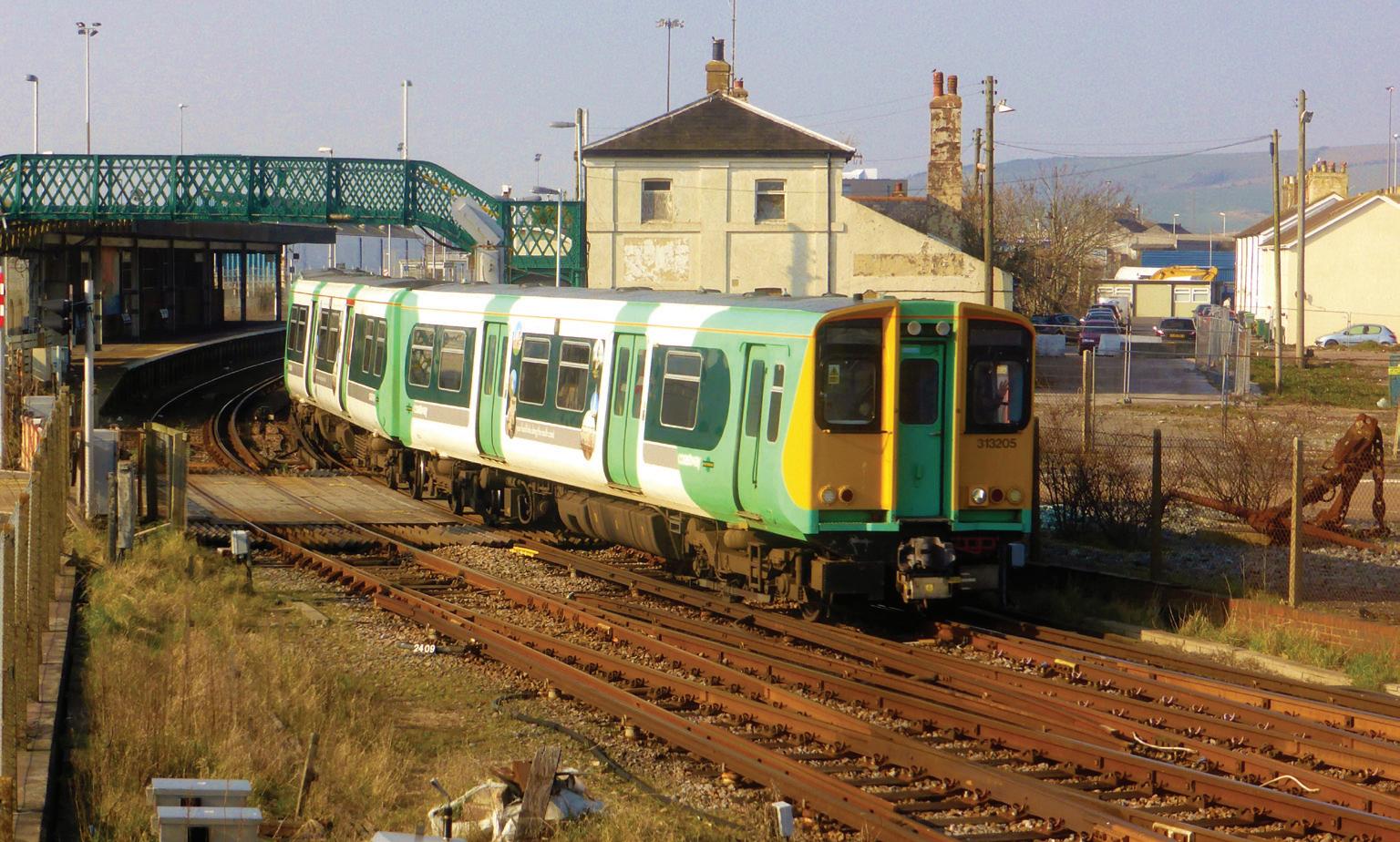
COMMENT
20 | 16 December 2022 www.passengertransport.co.uk
which 313s had when new. Ironically, although a pleasing gesture to the origin of the trains, the service hasn’t improved since they were all blue and grey. This, like many Southern trains, was overloaded. It eventually arrived a few minutes late (no explanation, no apology - see the pattern here?) for the next change towards Southampton. This should have departed at 2021 but eventually shuffled in at 2058 having left London Victoria late and missed out some prime stations including Clapham Junction and Gatwick Airport. The next one that should have turned up at 2040 for Southampton was cancelled. The result was a journey of 95 miles or so taking over four hours. My random sampling of services suggests that there are widespread problems.
Even slower trains
Sadly this sort of thing happens all the time and there are two consequences for users: you need to get the train before the one you really want on the basis that it is likely to be late or cancelled and it is always necessary to check before leaving home for the same reason. The impression for users is that Southern doesn’t care. This may sound a bit harsh but it has been going on for years, plenty of time to put right common problems. At the moment it’s lack of staff, but in the past we have had disputes over who should shut the train doors, driver or conductor. After numerous strikes, the driver is now in control of the doors and trains have an ‘onboard supervisor’ who does the minimum and often nothing at all because the train is too full to pass through. Pre-pandemic, a typical Southern experience was gross overcrowding, hard and wornout seats and unreliability. Now it seems to be degenerating further. Hoping that the passengers ‘have a pleasant journey’ is so far off the mark as to be insulting. On the plus side, Southern does have permanent bus stop flags near stations for when engineering works result in line closures, another reason not to attempt using the train.
Gloomy horizons
The afflictions that Southern regards as normal are indicative of embedded problems with an operator challenged to provide what they are contracted to operate. Even without the various disputes, Southern has been a mess for years. The network is vastly complex,

Even without the various disputes, Southern has been a mess for
there are millions of people to move and it is susceptible to slight difficulties multiplying into chaos. It isn’t only Southern thoughSouth Western Railway has its regular disasters and really doesn’t make efforts to ingratiate itself with its users. Here’s a recent example: to find a train and ticket, the National Rail website (incidentally also going downhill fast) has some bargain tickets for specific trains and redirects the hapless user to South Western Railway. Having got there, the bargain tickets disappear; the only way to get them is to go to another train operator’s web site, exemplifying the joys of the unintegrated railway. No doubt a whole team of people then expend vast effort reallocating revenue to the appropriate operators. With Delay Repay, if anyone can face the effort required, Southern must be really busy issuing refunds to the point where bothering to run trains at all is a real nuisance. Southeastern which operates another intensive part of the network has been operated directly
by the DfT since October 2021 following failure of the franchised operator.
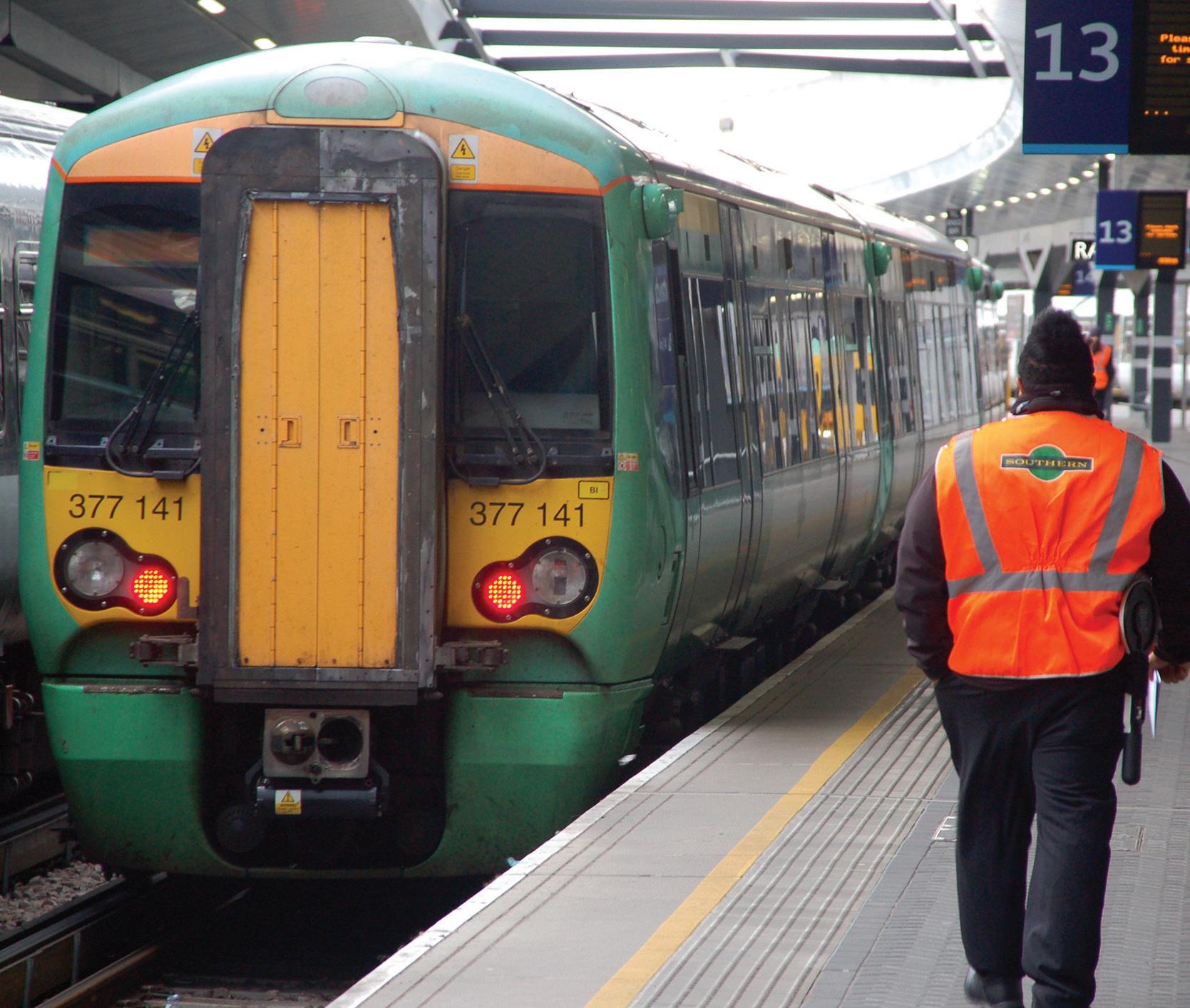
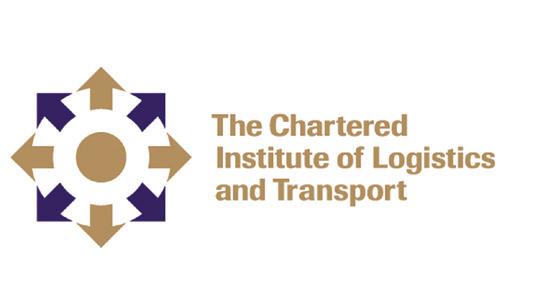
Under the current arrangements with DfT directing how the railway works, train operators have no incentive to improve the offer to passengers. It’s business as usual and for Southern that means offering an unreliable service. Anyone who aspires to become a privileged Southerner is welcome to sample the delights of Southern Railway then perhaps realise that the misery inflicted on rail users is not targeted solely at The North. Sadly, it adds up to a railway that lacks accountability, direction and any semblance of customer orientation. The passengers put up with it but all in all it’s far from pretty. With further strikes upon us, patience is running thin.
ABOUT THE AUTHOR
Nick Richardson is Technical Principal at transport consultancy Mott MacDonald, chair of CILT’s Bus and Coach Policy Group and a former chair of the Transport Planning Society. In addition, he has held a PCV licence for over 30 years.
IN ASSOCIATION WITH: www.ciltuk.org.uk Tel: 01536 740100 @ciltuk
“The impression for users is that Southern doesn’t care”
www.passengertransport.co.uk 16 December 2022 | 21
years
Public transport is the ‘bright light of the city’
Next June, Barcelona will host the first UITP Global Public Transport Summit in four years. We asked UITP’s secretary general, Mohamed Mezghani, about what visitors can look forward to
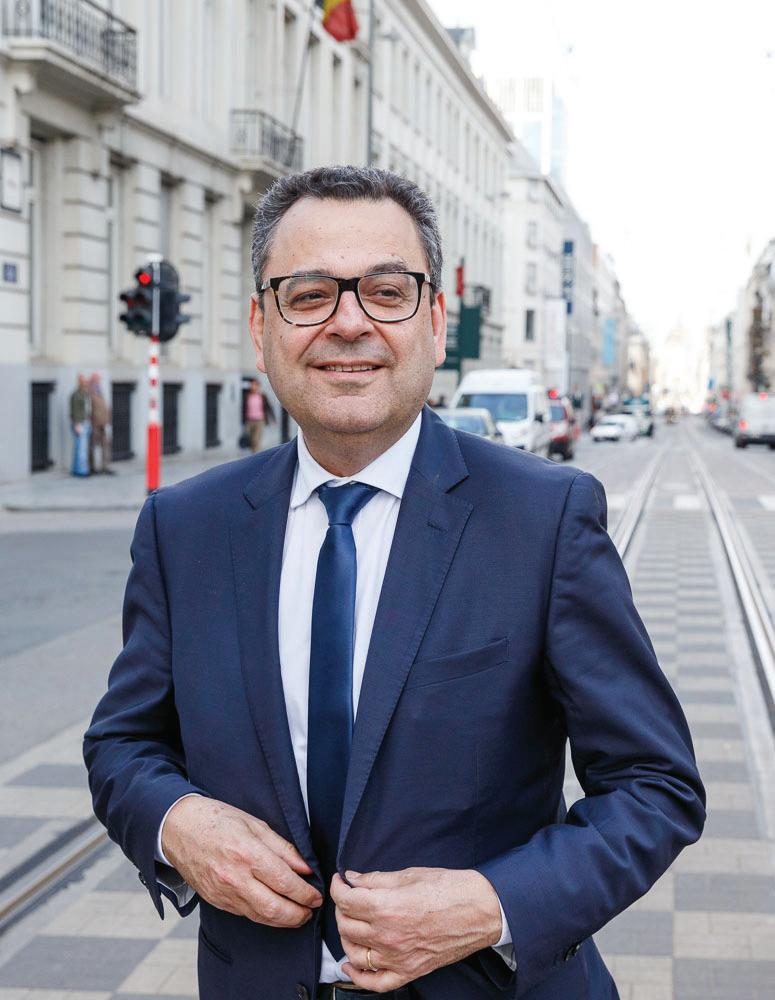
The UITP Global Public Transport Summit is heading to Barcelona next year (June 4-7) for the 2023 edition. What can you tell us about the planning and organising at this stage?
It’s an exciting time at UITP, that’s for sure! When we’re in the planning stage of the UITP Global Summit, there’s an extra amount of energy around. It’s a huge undertaking to bring an event of this size and prestige to the stage. There’s a lot of ideas flowing, and solid plans being made, and I am more than confident that we are on schedule to bring you an edition to remember. The road to Barcelona is set, and I’m excited and confident that we’re well on track.
What can you share with us about the programme and exhibition at this stage? It takes a lot of focus and consideration to put together a congress programme for a global summit. UITP is focused on all modes and all topics across public transport, and when hosting an event that brings the entire sector together, we need to make sure that we’re covering the whole gambit of the conversations taking place. As the summit has a truly global dimension to it, it attracts name and faces from across the globe eager to participate. UITP brings together all sector stakeholders, and that is on full display at each summit. It may sound like a cliche to say there’s something for everyone, but there truly is a topic, a session, a direction for every interest.
Right now, we have developed a focus built around two pillars - Cities and People. And from that, we are defining the tracks underneath those pillars that will present individual focus and topics. We know that public transport defines our cities, and we also know that is should always be for the people who work in it, and who use it. By determining a direction from those two pillars we are really going to have a programme that is relevant,
informative, and crucially, will help move the needle on what the sector should be talking about going forward. There is a challenge to create a programme fit for the current climate, and one that covers both public transport fundamentals, but also current trends and issues such as the energy crisis, inflation, staff shortages, and more.
For our exhibition, we are on track to fill more space than ever before. The exhibition is a phenomenal showcase of recognisable names and faces from across the sector, all around the world. It really is something to see.
The 2023 edition theme is set as ‘Bright Light of the City’. Can you expand for our readers the thinking behind that approach?
Since the global summits had a theme assigned to them, we’ve always worked to make it a relevant and interesting statement on where the sector is right now. In the last few years, we’ve moved that idea closer to creating a theme that is well connected to our host city. The city that has the honour to host the largest gathering of its kind in urban mobility plays a crucial role in the summit.
We saw this to incredible success with the 2019 edition in Stockholm and how ‘The Art of Public Transport’, and our visual campaign, saw our delegates really showcase the beauty of their metro stations and the surroundings in and around the city. With the theme set for the next edition in Barcelona, we will ask the sector to show us some new enthusiasm for 2023 with ‘Bright Light of the City’. The thinking behind this edition’s theme is rooted in both what public transport offers, and the city of Barcelona itself. Public transport is a guide. It navigates a way around a city. For workers, visitors, for everyone. When that takes place in a city like Barcelona, renowned for its incredible artistry, historical landmarks and stunning architecture, it is easy to find beauty in your surroundings. And with a wellconnected public transport system, across all modes, movement is easy and public transport should always be the bright light of any city.
Barcelona is a city renowned not only for its impressive public transport, but for its accessible living. Are you excited to see the world of urban mobility gather there in June?
We’re very fortunate at UITP to receive passionate and incredibly detailed bids from many international cities hoping to become
“Everyone agrees that public transport is essential... but the political and financial support is lacking”
SPECIAL REPORT UITP SUMMIT 22 | 16 December 2022 www.passengertransport.co.uk
Mohamed Mezghani
our next summit host. I have, and would love to continue, visiting all of them myself. With Barcelona selected for 2023, we’ll be arriving in a city that has a very impressive public transport system. The ease of access offered to people as they move around their surroundings is incredible, and the city has impressive plans to develop on that in the years ahead.
For the next edition, we also have our three local partners - FGC, TMB and Renfe - representing the region (Catalonia), the city (Barcelona) and the state (Spain). We were fortunate to co-host a local launch with all three in the city, and to see not only their own passion for the summit, but the local, regional and national players they brought together who shared their excitement. Public transport is full of passionate people with an energetic approach to the future, and to see a strong level of engagement and interest from the local partners, and those in Barcelona and beyond, gives us strong encouragement for next year.
This is the first UITP Global Summit since 2019. A great deal has changed since that gathering, has this impacted the direction of the Barcelona edition?
Public transport is certainly by no means alone as a sector impacted by the global pandemic. It was, unfortunately, badly impacted with ridership and finances hit since Covid began. These have been tough times. But I have been heartened throughout it by the strength of community across public transport that has really come to define our sector. From the very beginning, we came together knowing that a path through the tough times would be found in sharing ideas, experiences and working on solutions. UITP was in the position to be able to bring the sector together, digitally at first, and then when appropriate, in person.
Now that we are in a position to put into practice the best ways to rebuild, and reposition ourselves for the future, hosting the Global Summit gives us the opportunity to drive forward a direction fit for that future.
Public transport has changed and, as we work on the Barcelona programme, we know that it’s a crucial time to put fresh ideas into place, and come out the other side stronger and in best positioned for tomorrow. This will be a summit that discusses what the recent times have shown us, and how building back can make for a better public transport sector for everyone.
The global pandemic had a major impact on almost every sector around the world, including public transport. Where would you say the sector is now? The sector is rebuilding, this we know. But we also know that it is redefining itself. I think we are all aware that many sectors will not be in the same positions as they were before the pandemic. There’s no bouncing back; instead it is building back. The sector is in a much better position than it was in 2020 and 2021, ridership has increased in many cities, but remains slower to return in some locations. Political incentive was not as strong as it should have been during the pandemic, and public transport has had to fight hard to be seen and heard by decision-makers. However I am an optimist, and I know that those working in public transport will never stop fighting for its future.
What must also be considered of course, is that the pandemic has not, and is not, the only issue public transport faces. We are dealing with issues that stem from the pandemic, but also from ongoing conflicts and economic issues around the world. We are facing staff shortages, the energy crisis impacts public transport, the climate crisis continues to impact society, as does the ongoing issues with inflation - these all have a negative impact on daily functioning, and although public transport cannot solve these problems, we can find solutions in them to best suit our needs and concerns.
It is safe to say that the public transport sector is experiencing a paradoxical situation: everyone agrees that public transport is essential and part of the solution, but the political and financial support is lacking. I remain hopeful that we can address these concerns during the summit, as the best and brightest minds in the sector will come prepared to debate the challenges.
How important is the UITP Summit to the sector?

It’s not difficult for me to talk about how vital and valued the UITP Global Public Transport Summit is to the sector. It is valued and valuable. The UITP Summit goes all the way back to 1886, with the first edition hosted in Berlin, one year after UITP was created. That means it has been organised for more than 135 years! It’s part of the life of public transport and mobility professionals, but also attracts more and more policy-makers. I often hear from our members that is the highlight of their calendar, and for many the jewel in the crown of urban mobility gatherings. It is not by accident, or an act of chance that we welcome hundreds of exhibitors, speakers, thousands of delegates, and tens of thousands of visitors across three days. It’s the defining event in public transport and with the many networking and social events, alongside detailed technical visits, the summit is the place to be when it is in town!
There will be hundreds of exhibitors, speakers and delegates, as well as thousands of visitors. What can they expect to see and experience?
They will see a massive and truly impressive venue full of energy and excitement - packed with exhibitors, speakers and delegates from across the globe. Our exhibition has crossed the 80% space sold by the close of November, and is well on track to sell the remaining space at speed. There will be more than 300 speakers in our Congress, over 15,000 visitors can be expected across three days, and all of this activity will covered by upwards of 150 international press and media representatives. It’s unlikely a corner of the world won’t be covered in some form during the summit.
One thing we are passionate about is building an experience for those in attendance. For some this may be the only event of its size they attend each edition. I’m determined that whatever the experience is, and for whoever it is, they enjoy it, and take something away from it. Yes we are all there to showcase public transport, present innovations, and find solutions, but we’re also there to learn and enjoy. It must be an experience to treasure - and I want that for everyone who comes to join us in Barcelona.
“The sector is rebuilding, this we know. But we also know that it is redefining itself”
www.passengertransport.co.uk 16 December 2022 | 23
Barcelona is a city renowned for its impressive public transport
MORE ONLINE uitpsummit.org
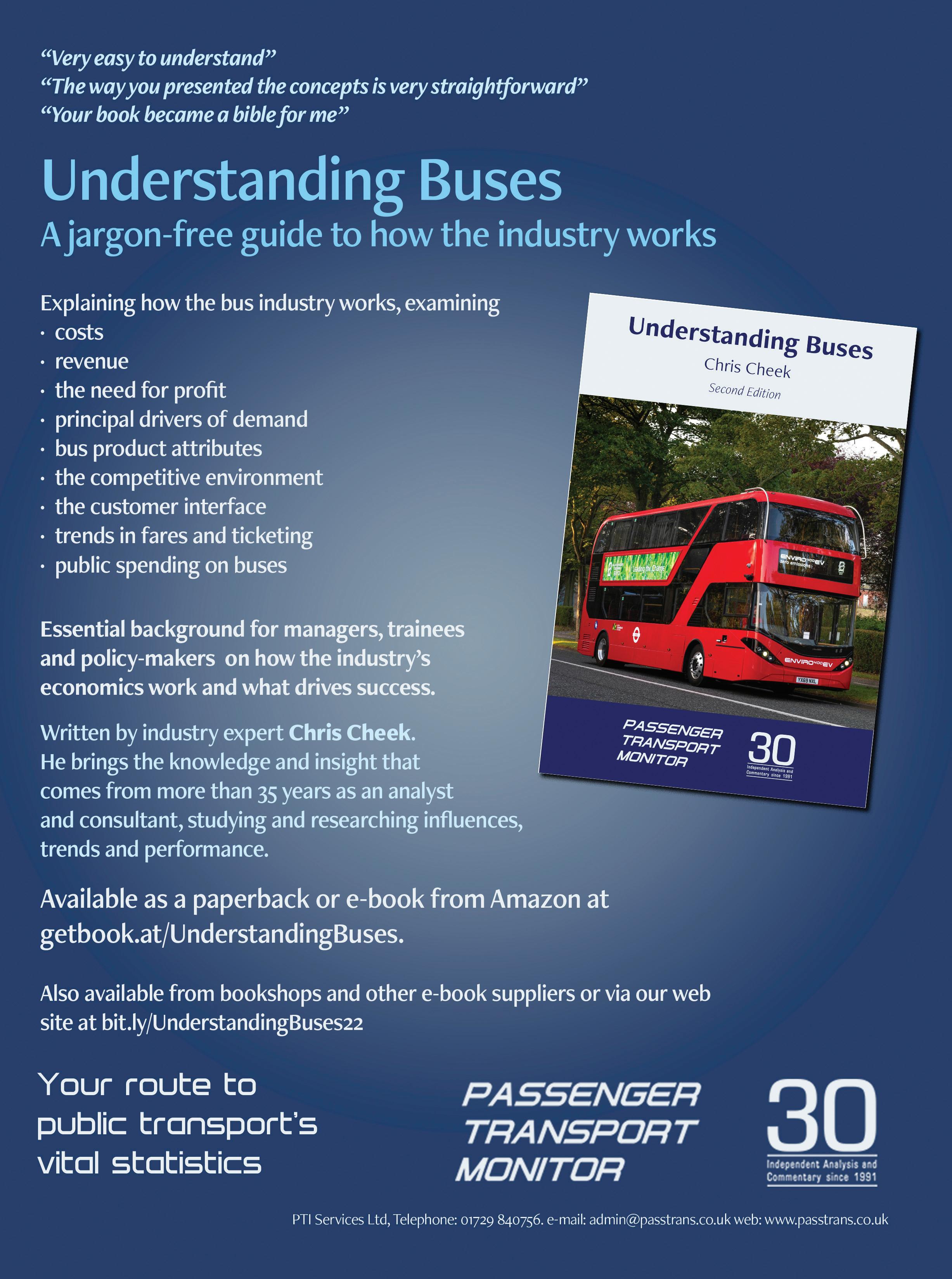
GRUMBLES
What will our end of term report say?
Our Whitehall insider imagines what’s going on inside the minds of the mandarins at Great Minster House, home of the DfT

2022 has been quite a year, hasn’t it! When it started I think you would have got very good odds on a bet that we would have had three prime ministers and three secretaries of state for transport by the year end. From a public transport perspective has it been a good or a bad year? Views will differ, I’m sure, depending on what part of the public transport industry you work in but I’m wondering what kind of end-of-term report we might be given here in Great Minster House.
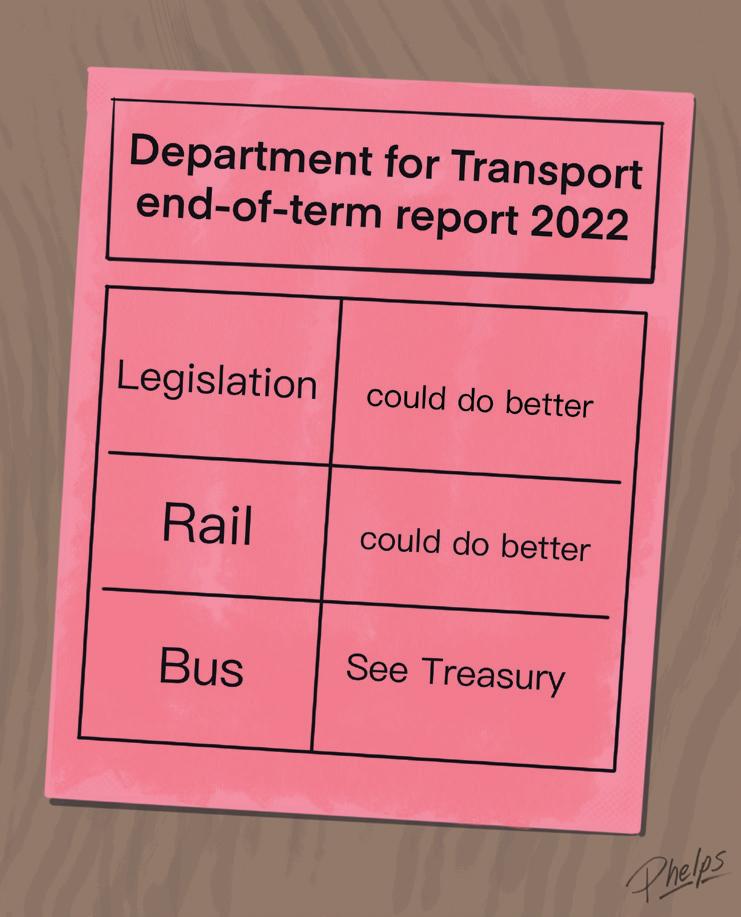
Today, of course, life is dominated by the rail strikes, and it’s not obvious to me that there will be an early resolution to the dispute. But what have we achieved from a policy perspective? The fact that we won’t have a Transport Bill to create Great British Railways is obviously disappointing. And our new secretary of state, Mark Harper, told the Transport Select Committee when he appeared before it on December 7 that there won’t even be the “narrow” Transport Bill addressing future transport issues that his predecessor, AnneMarie Trevelyan, had told the committee we were pitching for. So on the legislative front it’s surely a “can do better” mark!
Implementation of the Williams-Shapps Plan for Rail also seems to be taking forever, even on those issues which don’t need legislation. Interestingly, Mark Harper told the transport committee that he was taking his time to reflect on the issues so that he was happy with the way forward, which could be interpreted as meaning he is not yet convinced of the merits
of the package of reforms that the Plan for Rail proposed. Indeed, he even told the committee that there were alternative views about the way forward which had been put to him by some of his parliamentary colleagues. That seems to imply that there is not universal political buy-in to the Plan for Rail’s proposals, which in turn could imply that the plans may yet be changed. And, as I’ve said before, work on the new Passenger Service Contracts has stalled.
Take all that together and it’s hard not to conclude that, as with our performance on the legislative front, our end of term report on rail can only be another “can do better”. Perhaps this is unfair, as Mark Harper also told the
transport committee that this department and the Great British Railways Transition Team were doing a lot of work together. I have no doubt they are. I’m also in no doubt that much of this work is complex and can’t be put in place with a click of the fingers. But the Plan for Rail was published back in May 2021 and to the outside world there is no obvious sign of anything having changed since then. Indeed, rail passengers who use TransPennine Express and Avanti West Coast will tell you that things have got distinctly worse.
It’s a sobering thought that four years on from the announcement of the rail review very little tangible improvement has been delivered, at least from the passenger perspective. And here’s a thing. Mark Harper told the transport committee that rail takes up 60% of the department’s budget but only accounts for 10% of journey miles. That strikes me as an uneconomic and unbalanced equation.
On the buses front, I think I can be more generous. Many of the problems facing the industry have their root cause in Covid rather than any policy failure as such. The collapse in passenger numbers thanks to the pandemic is nobody’s fault. But the level of financial support that we led the industry and transport authorities to believe would be forthcoming to fund the first Bus Service Improvement Plans - but which was not forthcomingwas unfortunate to say the least. Whether responsibility for this lies here in Great Minster House or with the Treasury is another matter, and given that we have been pressing the Treasury to provide the necessary level of funding to prevent a drastic cut in service levels, I’m going to point the finger firmly at the Treasury.
There’s no doubt that the National Bus Strategy for England created a rod for our own backs, and we would have been wise not to publish it during the height of the pandemic and until its longer-term impact on the industry was clear. But this strategy was a creature as much of No 10 as of Great Minster House, so again I think we can largely be absolved of responsibility. Even so, the bus industry is not in a happy place right now.
As a turbulent 2022 draws to a close it only remains for me to wish everybody a Merry Christmas. I hope 2023 turns out to be more prosperous than the chancellor is suggesting might be the case.
COMMENT
www.passengertransport.co.uk 16 December 2022 | 25
“I hope 2023 turns out to be more prosperous than the chancellor is suggesting” GREAT MINSTER
Summit aims to tackle major driver shortage
CPT briefs buses minister on scale of driver vacancy rate
Buses minister Richard Holden was briefed by the Confederation of Passenger Transport about the scale of the bus and coach driver shortage in the UK at a special summit in London.
With a nationwide 10% (9.3% bus, 15.9% coach) driver vacancy rate, representatives from bus and coach operators, stakeholder bodies, combined authorities, as well as local and national governments, travelled down to Westminster to collaborate with Holden and Department for Transport officials on how to retain and attract more drivers behind the wheel.
“Tackling driver shortages in the bus and coach sector is a key
RETIREMENT AFTER A
63-YEAR CAREER
Bus builder Alexander Dennis has recognised its longest-serving employee, Tom Harley, who has now retired after clocking up a staggering 63 years of service with the Larbertbased business.
Harley joined Walter Alexander Coachbuilders, the Scottish bus manufacturer which was to become one of the major constituent parts of Alexander Dennis, in 1959. Since then he has been a constant presence through the company’s many periods of change.
As Walter Alexander’s engineering manager, he played a key role as the industry developed low floor
priority which is why we have worked with DVSA to increase the number of vocational tests available by training more vocational driving examiners,” said Holden.
“Discussions like this are crucial to ensure we collaborate with industry to retain and attract more people to an exciting career in the bus and coach sector.”
During the event, CPT and operators spoke about initiatives underway to attract and retain drivers. Discussions were also had on how streamlining the licence application and driver testing
processes could help the sector reduce the number of vacancies.
Following the summit the DfT and CPT will agree a prioritised action plan to give the bus and coach sector the tailored assistance it needs.
“Our summit explored recruitment and retention techniques, as well as streamlined processes, that could be taken by operators, the DfT, its agencies and other government departments to better onboard and retain drivers,” said CPT chief executive Graham Vidler.
PEOPLE
NATIONAL EXPRESS GROUP
National Express Group has announced the appointment of James Stamp as group chief financial officer. Stamp (pictured) latterly served as interim group CFO following the departure of Chris Davies. Prior to that he was CFO of the group’s UK and Germany operations.
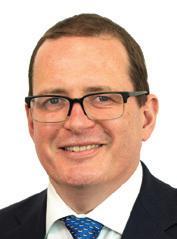
FLIXBUS UK
Richard Holden

technology in the 1990s and since then he has been fundamental to the growth of the business internationally, working tirelessly to conceive and deliver a whole host of new successful Enviro500 variants across the company’s major export markets, most recently as project manager for North America.
Harley’s accolades include supporting the company’s major customer base in Asia Pacific, as well as playing a key role in ADL’s push into the North America market by converting new customers to high-capacity double deckers.
The manufacturer has said its success in international markets, and the company’s resulting global leadership for double deck buses, would not have been possible without Harley’s dedication and
“These measures will help ensure buses and coaches not only play their part in slashing congestion and CO2 emissions, but more crucially, continue to get people to work, the shops, education, hospital appointments or leisure destinations.”
design work.
The company recently recognised Harley’s contribution to the business at a retirement event, attended by colleagues past and present with whom he worked closely over the years and hold him in highest regard.
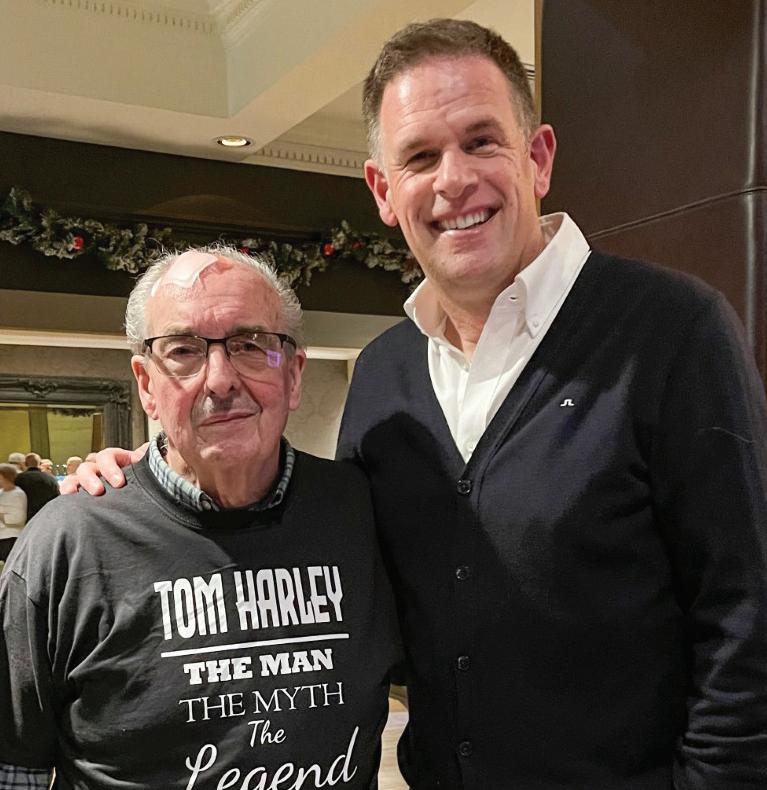
“Tom’s contribution and commitment to Alexander Dennis over more than 60 years has been
FlixBus UK has announced the appointment of Tadeo Mota as head of business development. Mota (pictured) has joined from De La Rue where he was business development director, overseeing the authentication department in Latin America and the Caribbean. He previously held business development roles at DVA Group and Flexperto.
exemplary and extraordinary,” said Paul Davies, ADL’s president and managing director.
“His enthusiasm for innovation and keen eye for design, ability to grow long-lasting customer and supplier relationships, underpinned by an incredible work ethic and commitment, has resulted in him being a key player in the globallyadmired UK bus manufacturing industry.”
Davies added that on a personal level, he has had the great privilege to work with Harley and he had been closely able to witness his consistent and long-lasting contribution at first hand.
He concluded: “I am proud to join our entire team in wishing him a well-deserved long and healthy retirement.”
APPOINTMENTS
Tom Harley leaves bus business he joined in 1959
Harley (left) with Paul Davies
“Tackling driver shortages is a key priority”
CAREERS 26 | 16 December 2022 www.passengertransport.co.uk
Stagecoach this week heralded the achievements of its female management team after two of its leaders were added to the ‘Women to Watch’ Index arranged by Women in Hospitality, Transport & Leisure (WiHTL).
Group head of media and public affairs, Emma Knight, and head of finance business partnering Emma Sidlow were included in the 2022 index for their contribution to the sector and their wider contribution to society, each of them holding a vital role in the company’s ‘Giving
for Good’ charity committee.
Knight, who is a member of the group’s senior operational board, provides advice and expertise on communications strategy at the highest level of the business.
Stagecoach described Knight as a keen advocate for diversity and inclusion, championing the company’s strategy for change. Knight is also leading a crossfunctional focus group to ensure continual improvements in the way in which Stagecoach communicates across the group’s business.
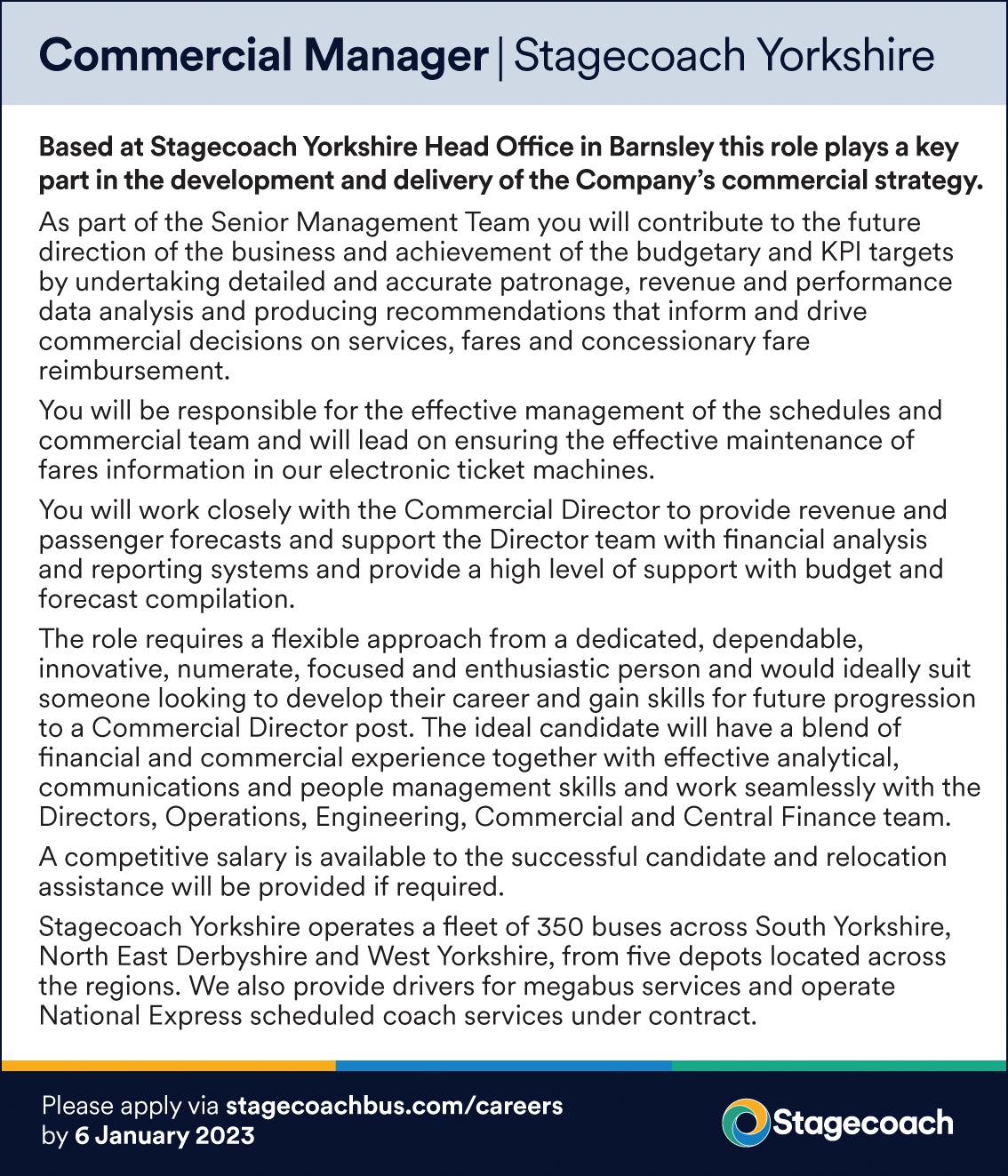
Sidlow was recently promoted to her current role and she was nominated for her focus on large business decisions supporting change, commercial, sustainability and technology.
Sidlow is also a trustee and treasurer for the Manchester homeless charity Emmaus and she is part of a team of trustees that has set up a new social enterprise in Wythenshawe. Sidlow is also the treasurer, chairing the finance committee to ensure the financial stability of the charity, so it can achieve
its goals.
Last year, two other female Stagecoach leaders were added to the index - Fiona Doherty, managing director for Stagecoach West Scotland and Sharon Vye-Parminter, health, safety and environment director.
In 2020, Stagecoach became the first major private sector multi-modal transport business in the country to appoint a woman at its helm, with Carla StocktonJones becoming UK managing director. She was also added to WiHTL’s ‘Role Model for Inclusion Index’ in 2021.
“I am extremely proud that two more of our female leaders have been added to this index,” said Stockton-Jones. “This celebrates and recognises the commitment each of these women have made to ensuring Stagecoach is successful, equal and an employer of choice.”
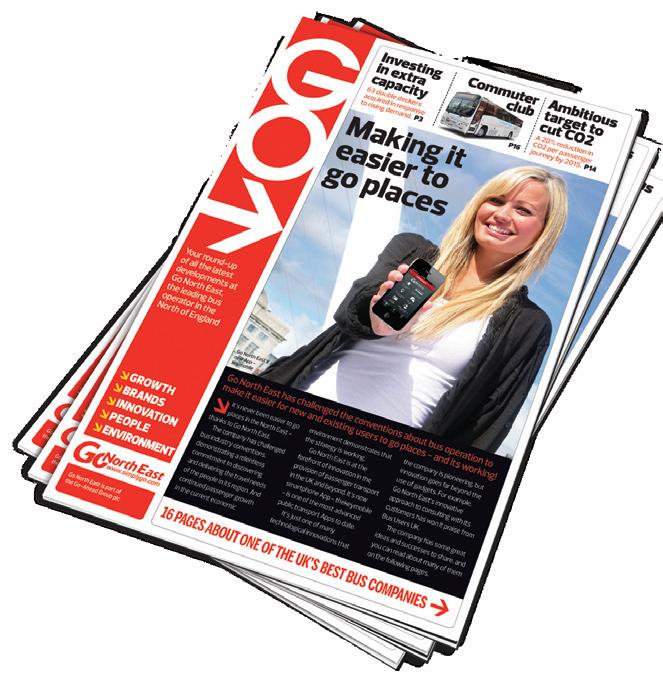
Female managersStagecoachrecognised Two female Stagecoach senior managers have been added to the respected Women in Hospitality, Transport & Leisure’s ‘Women to Watch’ index Contract Publishing Our experienced team of transport and publishing experts are available to produce bespoke, high quality publications or copywriting for your organisation. Our rates are very affordable. Email editorial@ passengertransport.co.uk or call 020 3950 8000 to find out more. CALL NOW TO ADVERTISE 020 3950 8000 or email sales@passengertransport.co.uk www.passengertransport.co.uk 16 December 2022 | 27
Maybe I’m amazed it’s Macca in First Class
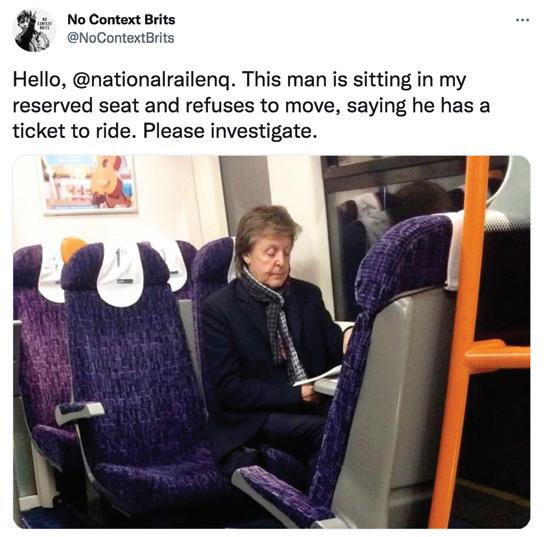
Social media can be a long and winding road
The National Rail Twitter account was forced to step in and respond recently to a viral ‘complaint’ about a rail passenger taking a reserved seat on a train. Luckily there was more to it than meets the eye as the complaint came from the ‘No Context Brits’ Twitter account - a satirical celebration of “all things great about Britain”. The complaint featured a picture of former Beatle Sir Paul McCartney sitting in the
47-year old Tom Humphries from Rickinghall, who won the top prize in the coach company’s 50 day giveaway, has decided to use the special one-off travel pass as part of a mission to travel on every single National Express route, visiting cities and towns in the UK along the way that he’s never visited before.

is sitting in my reserved seat and refuses to move, saying he has a ticket to ride. Please investigate.”
National Rail was quickly on the case and retweeted the meme with a clearly tongue-in-cheek note that the complaint had been thoroughly investigated by the rail industry.
“Hi @NoContextBrits,” they said. “We investigated your below query however, the person in question has made it very clear that he don’t care.”
It led to a flurry of Beatlesinspired puns” “Did he get a return or just a Day Tripper?” one person said. Another wrote: “Was this Yesterday?” A third posted: “Leave it yeah... just let it be.”
A LEGO SET BASED IN RAIL REALITY
The Christmas period is usually the time the rail industry undertakes a lot of upgrade and engineering works - after all it makes sense to use the quieter travelling period to minimise disruption to passengers.
Tom has spent the last 12 years travelling from London up to Scotland to see his girlfriend and will now be able to take every single journey for free with National Express.
And it’s pleasing to see, er, Lego imitating life with a new Lego City set that features engineering works at a railway station, complete with a rail replacement bus and supervisory staff!
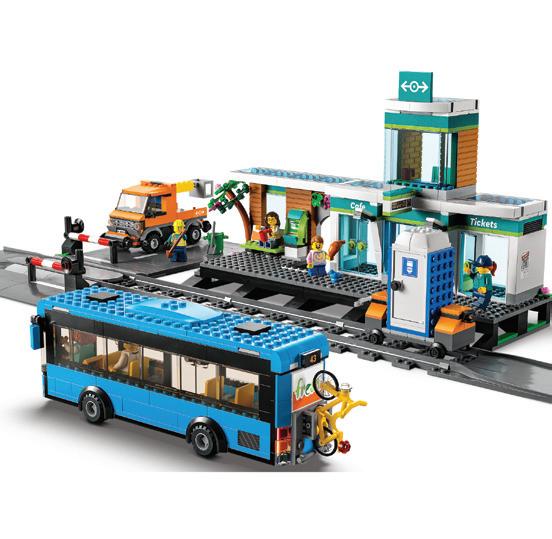
The winner of a ‘money can’t buy’ prize is looking forward to free adventures with National Express to the age of 97, after winning a 50-year travel pass.
The coach operator gave away a surprise prize every day for 50 days, including the 50-year pass for travel across its UK-wide network, as part of its celebration of 50 years on the road.
“I have very fond memories of travelling on the double decker National Express Rapide from London to Bristol to visit my nanna, dreaming of getting the top deck front seat as it was always a great view.” he said.
“Now I can continue limitless National Express adventures until I’m 97 years old!”
“Finally a Lego set that represents the real spirit of Christmas for railway fans,” Tweeted former First Bus manager Marc Bichtemann. “Note, the bus saves the day.”
SEEN SOMETHING QUIRKY?
Why not drop us a line at editorial@passengertransport.co.uk
SUBSCRIPTION ORDER FORM All annual subscription rates include delivery by secondclass post, or airmail for overseas. Please note: At present we are unable to provide printed subscriptions to readers based in European Union member countries. ANNUA L SUBSCRIPTION R ATES 1 year UK: £140 Rest of World: £280 2 year UK: £250 3 year UK: £375 WWW.PASSENGERTRANSPORT.CO.UK N A M E JOB TITLE CO M PANY ADDRESS POSTCODE TEL E M AIL DATE PLEASE START MY SUBSCRIPTION TO PASSENGER TRANSPORT CARD NU M BER SECURITY CODE EXPIRY DATE SIGNATURE I enclose a cheque for £ made payable to Passenger Transport Publishing Limited Please invoice my company (official order enclosed) I authorise you to debit my M astercard/VISA/ M aestro/VISA Electron card. Amount £ PT279 Email: subs@passengertransport.co.uk Return to: Subscriptions, Passenger Transport Publishing Ltd, PO Box 5496, Westbury BA13 9BX
‘Is that PSVAR compliant?’
First Class area of a train. Referencing the Beatles’ 1966 hit ‘Ticket To Ride’, the Tweet noted: “Hello, @nationalrailenq. This man
TAKE THE NATIONAL EXPRESS FOR FREE
All aboard!
DIVERSIONS 28 | 16 December 2022 www.passengertransport.co.uk



































